The role of stakeholders and external bodies
VerifiedAdded on 2022/09/16
|23
|5839
|22
AI Summary
Contribute Materials
Your contribution can guide someone’s learning journey. Share your
documents today.
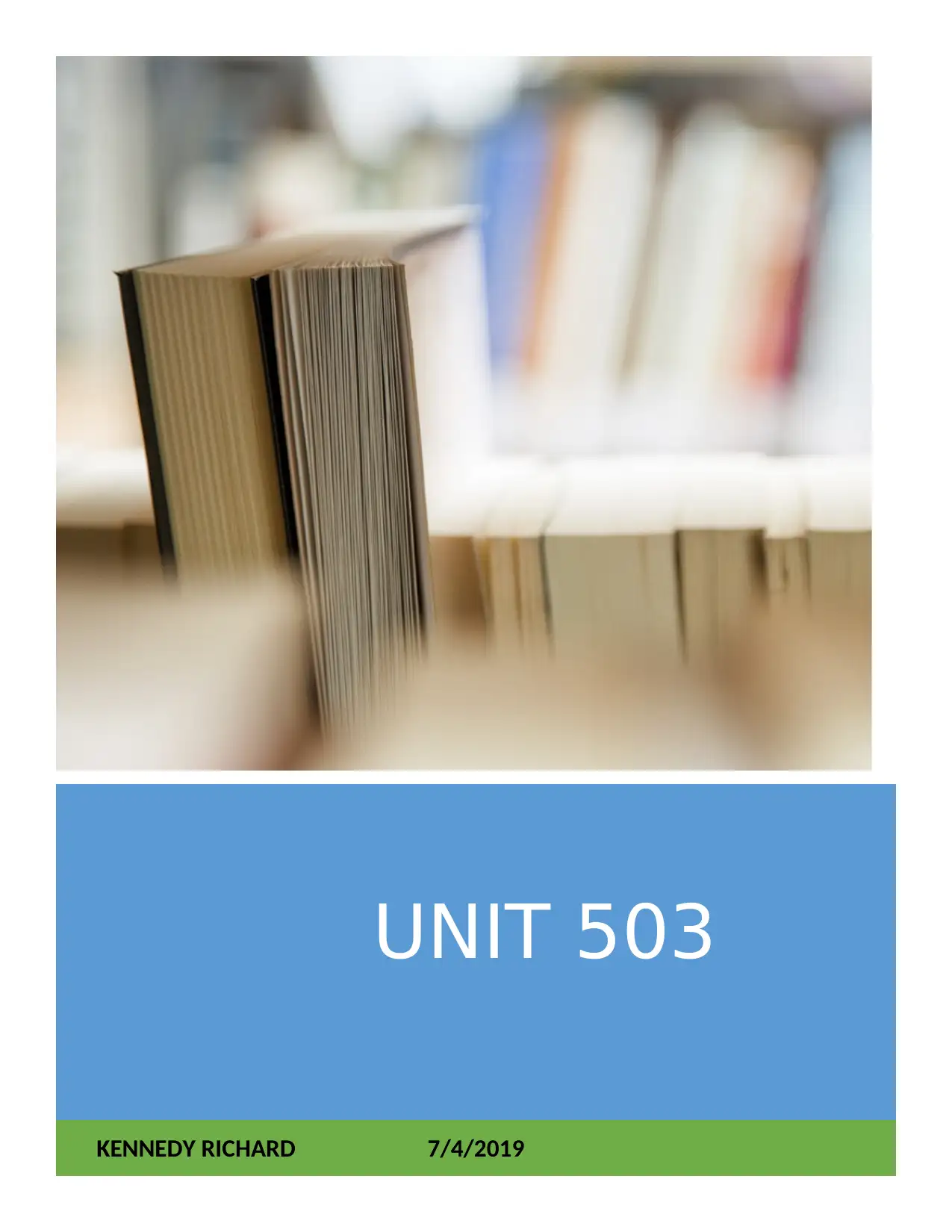
UNIT 503
KENNEDY RICHARD 7/4/2019
KENNEDY RICHARD 7/4/2019
Secure Best Marks with AI Grader
Need help grading? Try our AI Grader for instant feedback on your assignments.
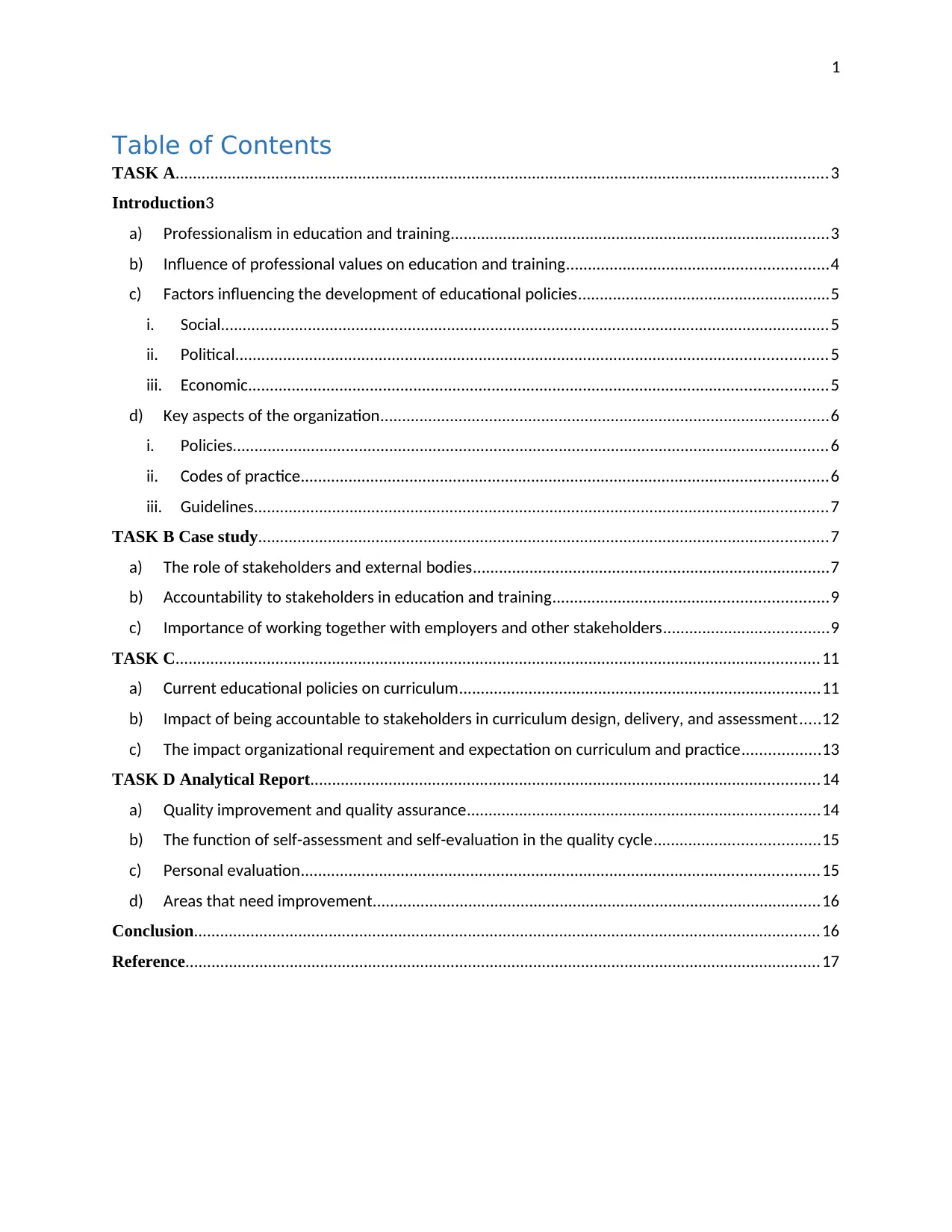
1
Table of Contents
TASK A......................................................................................................................................................3
Introduction3
a) Professionalism in education and training.......................................................................................3
b) Influence of professional values on education and training............................................................4
c) Factors influencing the development of educational policies..........................................................5
i. Social............................................................................................................................................5
ii. Political........................................................................................................................................5
iii. Economic.....................................................................................................................................5
d) Key aspects of the organization.......................................................................................................6
i. Policies.........................................................................................................................................6
ii. Codes of practice.........................................................................................................................6
iii. Guidelines....................................................................................................................................7
TASK B Case study...................................................................................................................................7
a) The role of stakeholders and external bodies..................................................................................7
b) Accountability to stakeholders in education and training...............................................................9
c) Importance of working together with employers and other stakeholders......................................9
TASK C....................................................................................................................................................11
a) Current educational policies on curriculum...................................................................................11
b) Impact of being accountable to stakeholders in curriculum design, delivery, and assessment.....12
c) The impact organizational requirement and expectation on curriculum and practice..................13
TASK D Analytical Report.....................................................................................................................14
a) Quality improvement and quality assurance.................................................................................14
b) The function of self-assessment and self-evaluation in the quality cycle......................................15
c) Personal evaluation.......................................................................................................................15
d) Areas that need improvement.......................................................................................................16
Conclusion................................................................................................................................................16
Reference..................................................................................................................................................17
Table of Contents
TASK A......................................................................................................................................................3
Introduction3
a) Professionalism in education and training.......................................................................................3
b) Influence of professional values on education and training............................................................4
c) Factors influencing the development of educational policies..........................................................5
i. Social............................................................................................................................................5
ii. Political........................................................................................................................................5
iii. Economic.....................................................................................................................................5
d) Key aspects of the organization.......................................................................................................6
i. Policies.........................................................................................................................................6
ii. Codes of practice.........................................................................................................................6
iii. Guidelines....................................................................................................................................7
TASK B Case study...................................................................................................................................7
a) The role of stakeholders and external bodies..................................................................................7
b) Accountability to stakeholders in education and training...............................................................9
c) Importance of working together with employers and other stakeholders......................................9
TASK C....................................................................................................................................................11
a) Current educational policies on curriculum...................................................................................11
b) Impact of being accountable to stakeholders in curriculum design, delivery, and assessment.....12
c) The impact organizational requirement and expectation on curriculum and practice..................13
TASK D Analytical Report.....................................................................................................................14
a) Quality improvement and quality assurance.................................................................................14
b) The function of self-assessment and self-evaluation in the quality cycle......................................15
c) Personal evaluation.......................................................................................................................15
d) Areas that need improvement.......................................................................................................16
Conclusion................................................................................................................................................16
Reference..................................................................................................................................................17
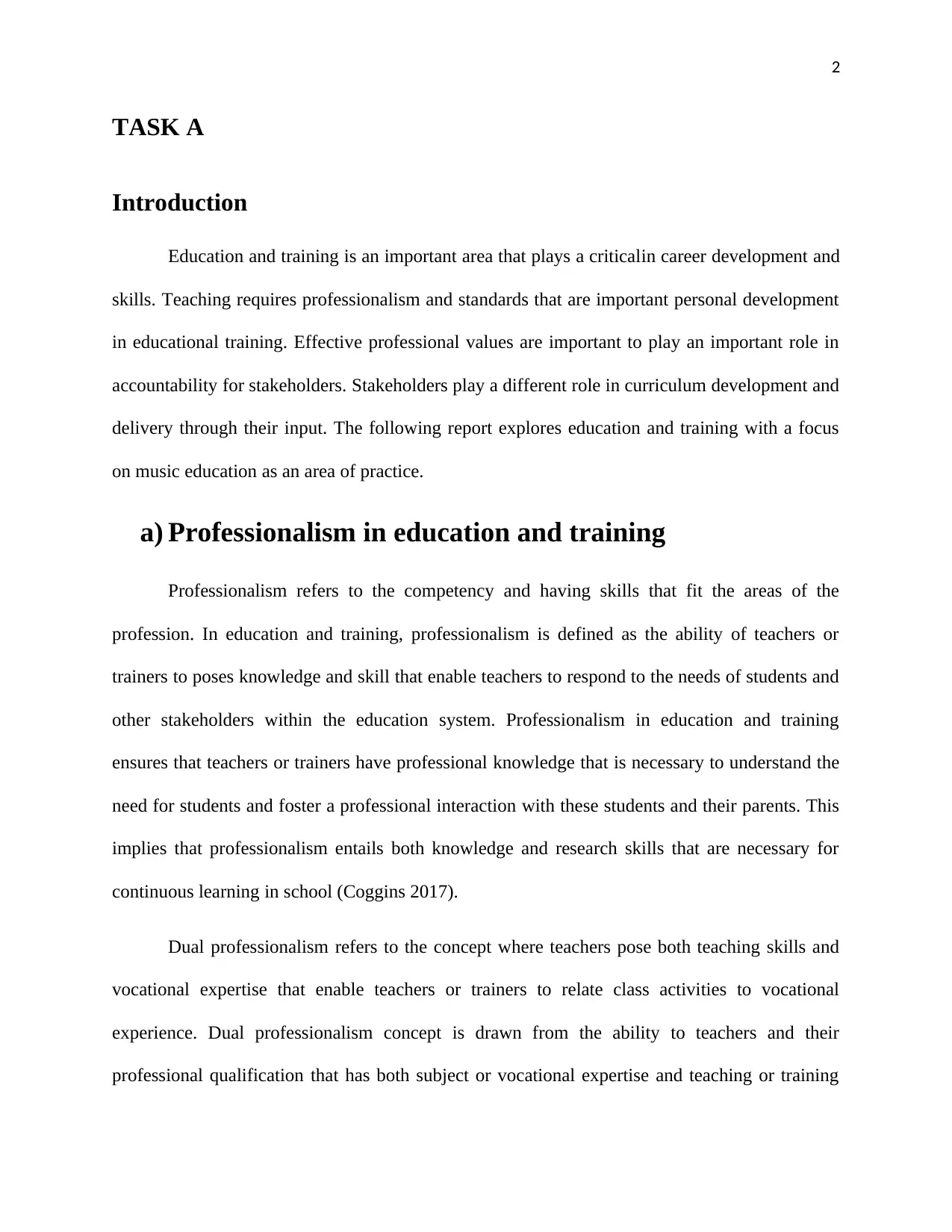
2
TASK A
Introduction
Education and training is an important area that plays a criticalin career development and
skills. Teaching requires professionalism and standards that are important personal development
in educational training. Effective professional values are important to play an important role in
accountability for stakeholders. Stakeholders play a different role in curriculum development and
delivery through their input. The following report explores education and training with a focus
on music education as an area of practice.
a) Professionalism in education and training
Professionalism refers to the competency and having skills that fit the areas of the
profession. In education and training, professionalism is defined as the ability of teachers or
trainers to poses knowledge and skill that enable teachers to respond to the needs of students and
other stakeholders within the education system. Professionalism in education and training
ensures that teachers or trainers have professional knowledge that is necessary to understand the
need for students and foster a professional interaction with these students and their parents. This
implies that professionalism entails both knowledge and research skills that are necessary for
continuous learning in school (Coggins 2017).
Dual professionalism refers to the concept where teachers pose both teaching skills and
vocational expertise that enable teachers or trainers to relate class activities to vocational
experience. Dual professionalism concept is drawn from the ability to teachers and their
professional qualification that has both subject or vocational expertise and teaching or training
TASK A
Introduction
Education and training is an important area that plays a criticalin career development and
skills. Teaching requires professionalism and standards that are important personal development
in educational training. Effective professional values are important to play an important role in
accountability for stakeholders. Stakeholders play a different role in curriculum development and
delivery through their input. The following report explores education and training with a focus
on music education as an area of practice.
a) Professionalism in education and training
Professionalism refers to the competency and having skills that fit the areas of the
profession. In education and training, professionalism is defined as the ability of teachers or
trainers to poses knowledge and skill that enable teachers to respond to the needs of students and
other stakeholders within the education system. Professionalism in education and training
ensures that teachers or trainers have professional knowledge that is necessary to understand the
need for students and foster a professional interaction with these students and their parents. This
implies that professionalism entails both knowledge and research skills that are necessary for
continuous learning in school (Coggins 2017).
Dual professionalism refers to the concept where teachers pose both teaching skills and
vocational expertise that enable teachers or trainers to relate class activities to vocational
experience. Dual professionalism concept is drawn from the ability to teachers and their
professional qualification that has both subject or vocational expertise and teaching or training
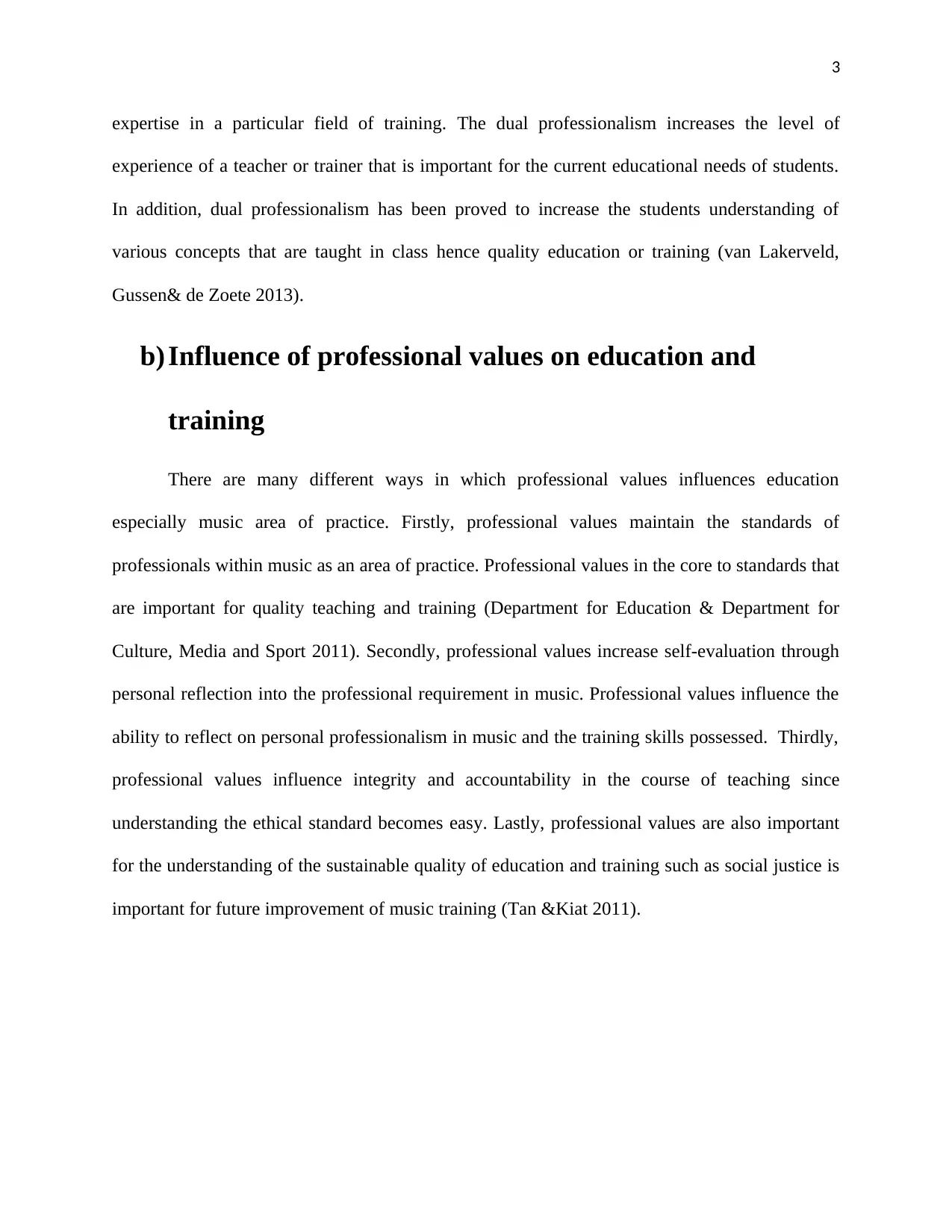
3
expertise in a particular field of training. The dual professionalism increases the level of
experience of a teacher or trainer that is important for the current educational needs of students.
In addition, dual professionalism has been proved to increase the students understanding of
various concepts that are taught in class hence quality education or training (van Lakerveld,
Gussen& de Zoete 2013).
b) Influence of professional values on education and
training
There are many different ways in which professional values influences education
especially music area of practice. Firstly, professional values maintain the standards of
professionals within music as an area of practice. Professional values in the core to standards that
are important for quality teaching and training (Department for Education & Department for
Culture, Media and Sport 2011). Secondly, professional values increase self-evaluation through
personal reflection into the professional requirement in music. Professional values influence the
ability to reflect on personal professionalism in music and the training skills possessed. Thirdly,
professional values influence integrity and accountability in the course of teaching since
understanding the ethical standard becomes easy. Lastly, professional values are also important
for the understanding of the sustainable quality of education and training such as social justice is
important for future improvement of music training (Tan &Kiat 2011).
expertise in a particular field of training. The dual professionalism increases the level of
experience of a teacher or trainer that is important for the current educational needs of students.
In addition, dual professionalism has been proved to increase the students understanding of
various concepts that are taught in class hence quality education or training (van Lakerveld,
Gussen& de Zoete 2013).
b) Influence of professional values on education and
training
There are many different ways in which professional values influences education
especially music area of practice. Firstly, professional values maintain the standards of
professionals within music as an area of practice. Professional values in the core to standards that
are important for quality teaching and training (Department for Education & Department for
Culture, Media and Sport 2011). Secondly, professional values increase self-evaluation through
personal reflection into the professional requirement in music. Professional values influence the
ability to reflect on personal professionalism in music and the training skills possessed. Thirdly,
professional values influence integrity and accountability in the course of teaching since
understanding the ethical standard becomes easy. Lastly, professional values are also important
for the understanding of the sustainable quality of education and training such as social justice is
important for future improvement of music training (Tan &Kiat 2011).
Secure Best Marks with AI Grader
Need help grading? Try our AI Grader for instant feedback on your assignments.
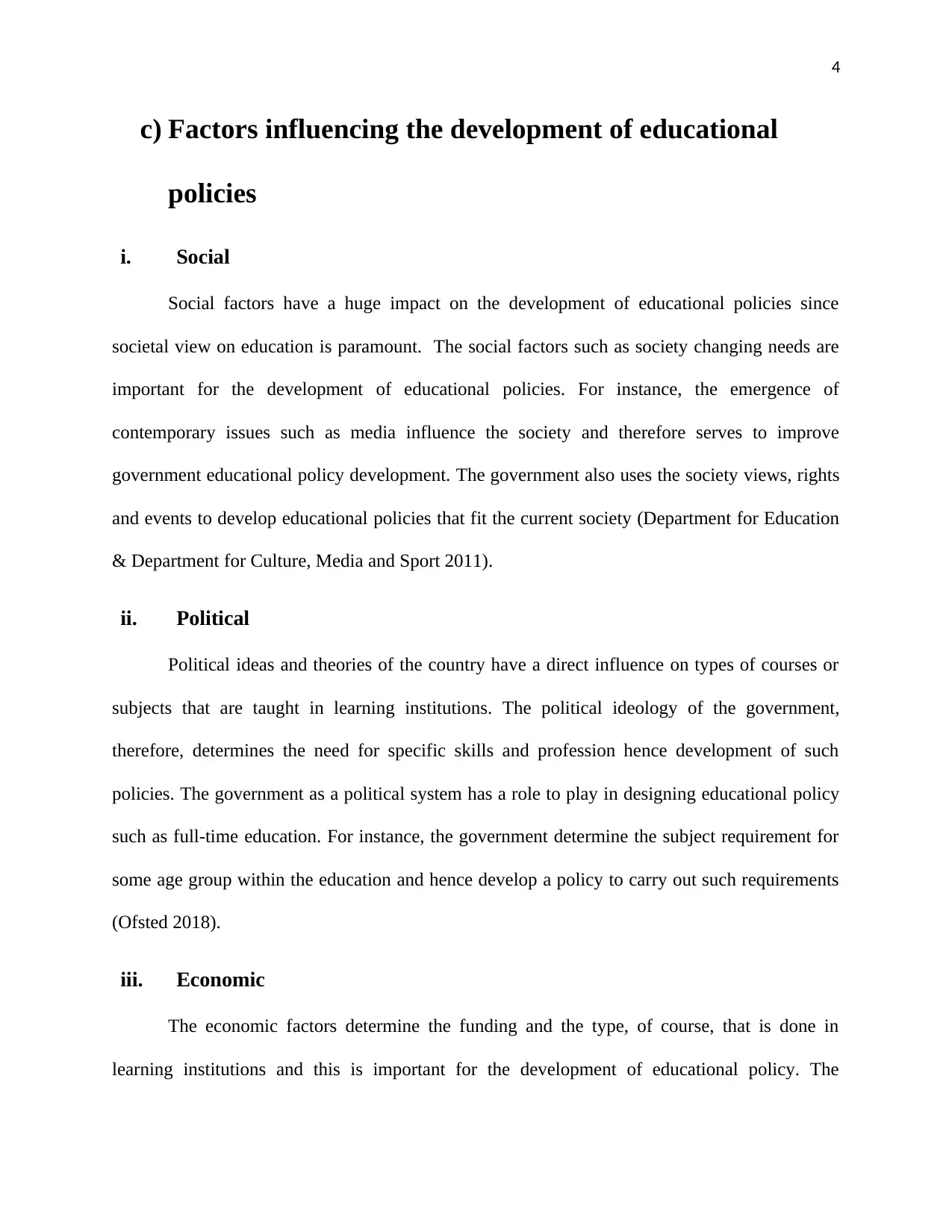
4
c) Factors influencing the development of educational
policies
i. Social
Social factors have a huge impact on the development of educational policies since
societal view on education is paramount. The social factors such as society changing needs are
important for the development of educational policies. For instance, the emergence of
contemporary issues such as media influence the society and therefore serves to improve
government educational policy development. The government also uses the society views, rights
and events to develop educational policies that fit the current society (Department for Education
& Department for Culture, Media and Sport 2011).
ii. Political
Political ideas and theories of the country have a direct influence on types of courses or
subjects that are taught in learning institutions. The political ideology of the government,
therefore, determines the need for specific skills and profession hence development of such
policies. The government as a political system has a role to play in designing educational policy
such as full-time education. For instance, the government determine the subject requirement for
some age group within the education and hence develop a policy to carry out such requirements
(Ofsted 2018).
iii. Economic
The economic factors determine the funding and the type, of course, that is done in
learning institutions and this is important for the development of educational policy. The
c) Factors influencing the development of educational
policies
i. Social
Social factors have a huge impact on the development of educational policies since
societal view on education is paramount. The social factors such as society changing needs are
important for the development of educational policies. For instance, the emergence of
contemporary issues such as media influence the society and therefore serves to improve
government educational policy development. The government also uses the society views, rights
and events to develop educational policies that fit the current society (Department for Education
& Department for Culture, Media and Sport 2011).
ii. Political
Political ideas and theories of the country have a direct influence on types of courses or
subjects that are taught in learning institutions. The political ideology of the government,
therefore, determines the need for specific skills and profession hence development of such
policies. The government as a political system has a role to play in designing educational policy
such as full-time education. For instance, the government determine the subject requirement for
some age group within the education and hence develop a policy to carry out such requirements
(Ofsted 2018).
iii. Economic
The economic factors determine the funding and the type, of course, that is done in
learning institutions and this is important for the development of educational policy. The
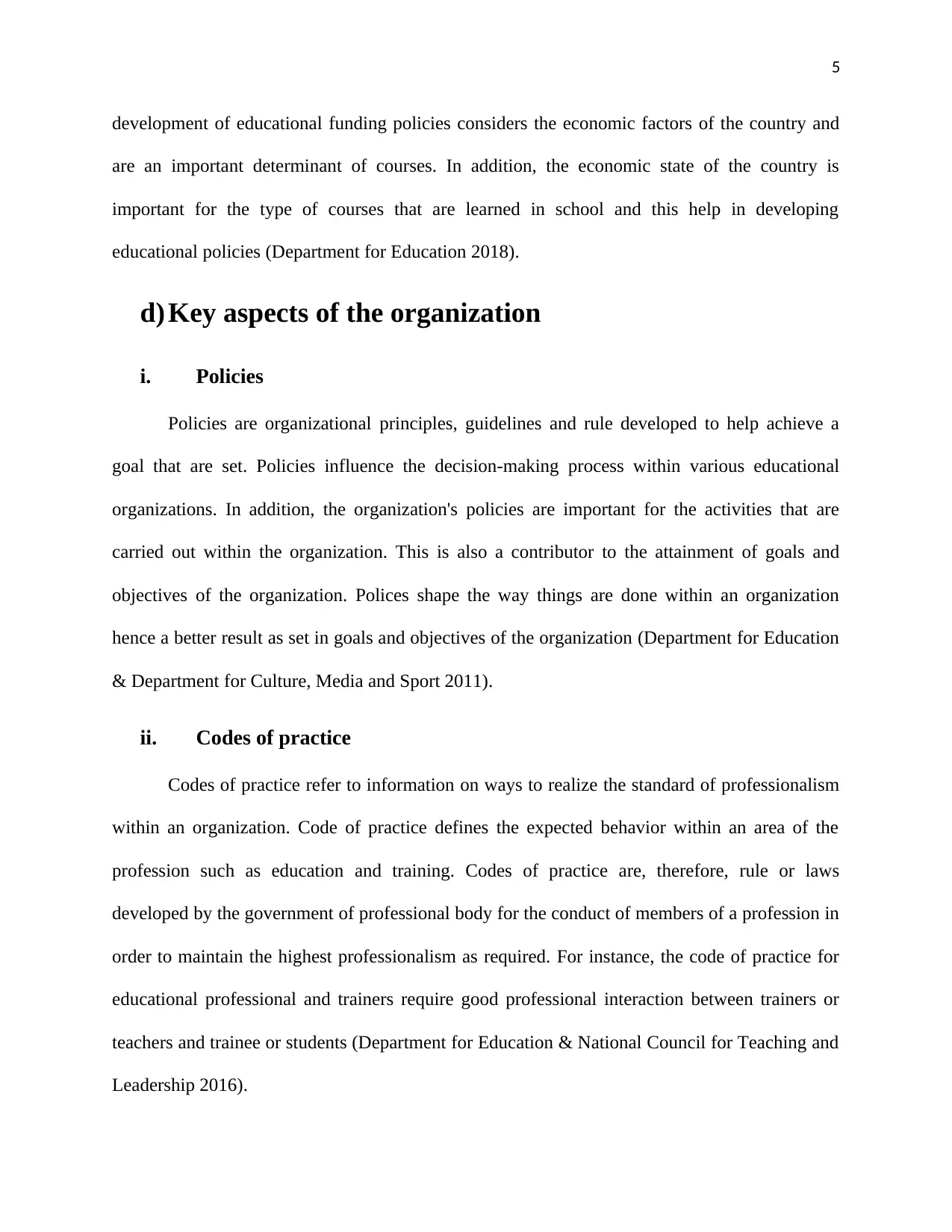
5
development of educational funding policies considers the economic factors of the country and
are an important determinant of courses. In addition, the economic state of the country is
important for the type of courses that are learned in school and this help in developing
educational policies (Department for Education 2018).
d) Key aspects of the organization
i. Policies
Policies are organizational principles, guidelines and rule developed to help achieve a
goal that are set. Policies influence the decision-making process within various educational
organizations. In addition, the organization's policies are important for the activities that are
carried out within the organization. This is also a contributor to the attainment of goals and
objectives of the organization. Polices shape the way things are done within an organization
hence a better result as set in goals and objectives of the organization (Department for Education
& Department for Culture, Media and Sport 2011).
ii. Codes of practice
Codes of practice refer to information on ways to realize the standard of professionalism
within an organization. Code of practice defines the expected behavior within an area of the
profession such as education and training. Codes of practice are, therefore, rule or laws
developed by the government of professional body for the conduct of members of a profession in
order to maintain the highest professionalism as required. For instance, the code of practice for
educational professional and trainers require good professional interaction between trainers or
teachers and trainee or students (Department for Education & National Council for Teaching and
Leadership 2016).
development of educational funding policies considers the economic factors of the country and
are an important determinant of courses. In addition, the economic state of the country is
important for the type of courses that are learned in school and this help in developing
educational policies (Department for Education 2018).
d) Key aspects of the organization
i. Policies
Policies are organizational principles, guidelines and rule developed to help achieve a
goal that are set. Policies influence the decision-making process within various educational
organizations. In addition, the organization's policies are important for the activities that are
carried out within the organization. This is also a contributor to the attainment of goals and
objectives of the organization. Polices shape the way things are done within an organization
hence a better result as set in goals and objectives of the organization (Department for Education
& Department for Culture, Media and Sport 2011).
ii. Codes of practice
Codes of practice refer to information on ways to realize the standard of professionalism
within an organization. Code of practice defines the expected behavior within an area of the
profession such as education and training. Codes of practice are, therefore, rule or laws
developed by the government of professional body for the conduct of members of a profession in
order to maintain the highest professionalism as required. For instance, the code of practice for
educational professional and trainers require good professional interaction between trainers or
teachers and trainee or students (Department for Education & National Council for Teaching and
Leadership 2016).
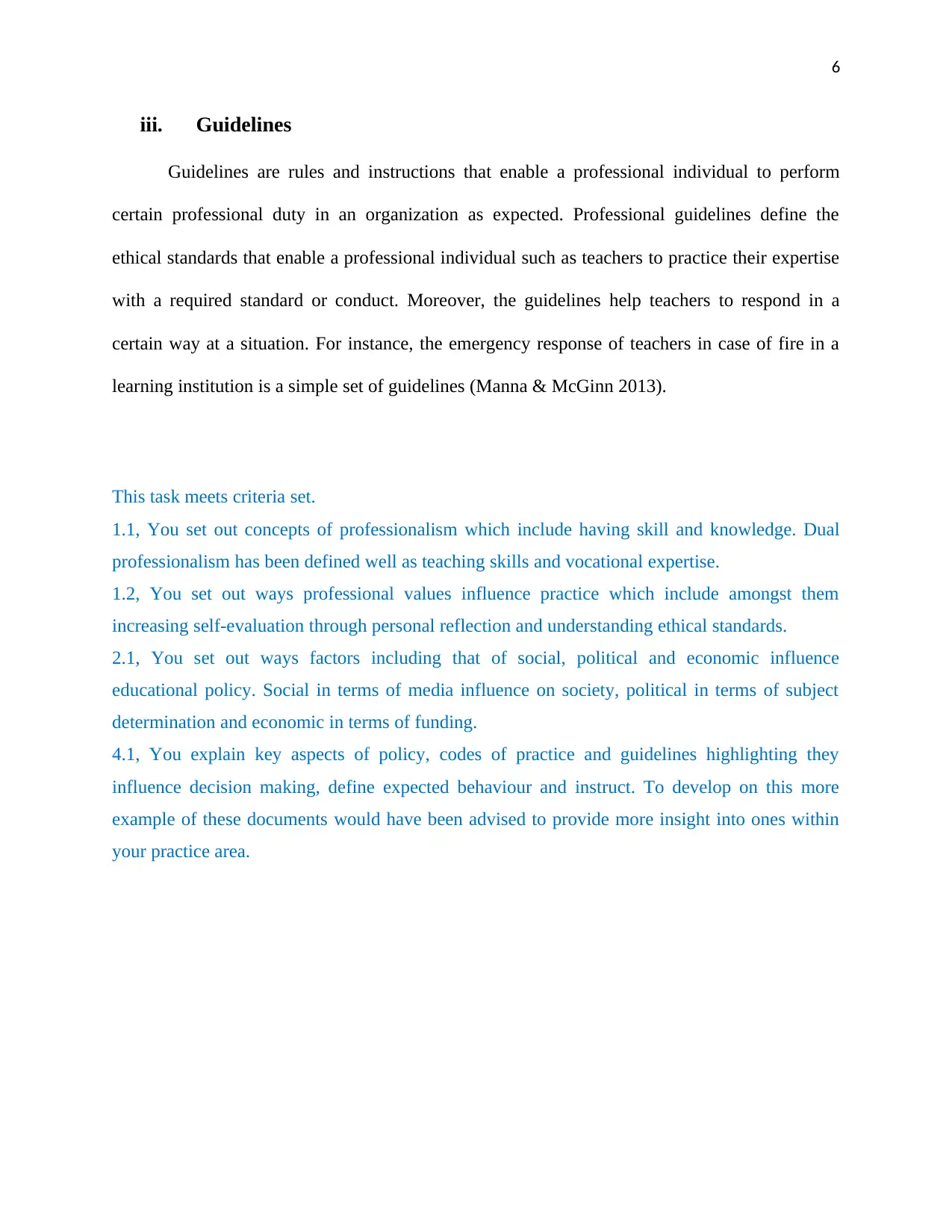
6
iii. Guidelines
Guidelines are rules and instructions that enable a professional individual to perform
certain professional duty in an organization as expected. Professional guidelines define the
ethical standards that enable a professional individual such as teachers to practice their expertise
with a required standard or conduct. Moreover, the guidelines help teachers to respond in a
certain way at a situation. For instance, the emergency response of teachers in case of fire in a
learning institution is a simple set of guidelines (Manna & McGinn 2013).
This task meets criteria set.
1.1, You set out concepts of professionalism which include having skill and knowledge. Dual
professionalism has been defined well as teaching skills and vocational expertise.
1.2, You set out ways professional values influence practice which include amongst them
increasing self-evaluation through personal reflection and understanding ethical standards.
2.1, You set out ways factors including that of social, political and economic influence
educational policy. Social in terms of media influence on society, political in terms of subject
determination and economic in terms of funding.
4.1, You explain key aspects of policy, codes of practice and guidelines highlighting they
influence decision making, define expected behaviour and instruct. To develop on this more
example of these documents would have been advised to provide more insight into ones within
your practice area.
iii. Guidelines
Guidelines are rules and instructions that enable a professional individual to perform
certain professional duty in an organization as expected. Professional guidelines define the
ethical standards that enable a professional individual such as teachers to practice their expertise
with a required standard or conduct. Moreover, the guidelines help teachers to respond in a
certain way at a situation. For instance, the emergency response of teachers in case of fire in a
learning institution is a simple set of guidelines (Manna & McGinn 2013).
This task meets criteria set.
1.1, You set out concepts of professionalism which include having skill and knowledge. Dual
professionalism has been defined well as teaching skills and vocational expertise.
1.2, You set out ways professional values influence practice which include amongst them
increasing self-evaluation through personal reflection and understanding ethical standards.
2.1, You set out ways factors including that of social, political and economic influence
educational policy. Social in terms of media influence on society, political in terms of subject
determination and economic in terms of funding.
4.1, You explain key aspects of policy, codes of practice and guidelines highlighting they
influence decision making, define expected behaviour and instruct. To develop on this more
example of these documents would have been advised to provide more insight into ones within
your practice area.
Paraphrase This Document
Need a fresh take? Get an instant paraphrase of this document with our AI Paraphraser
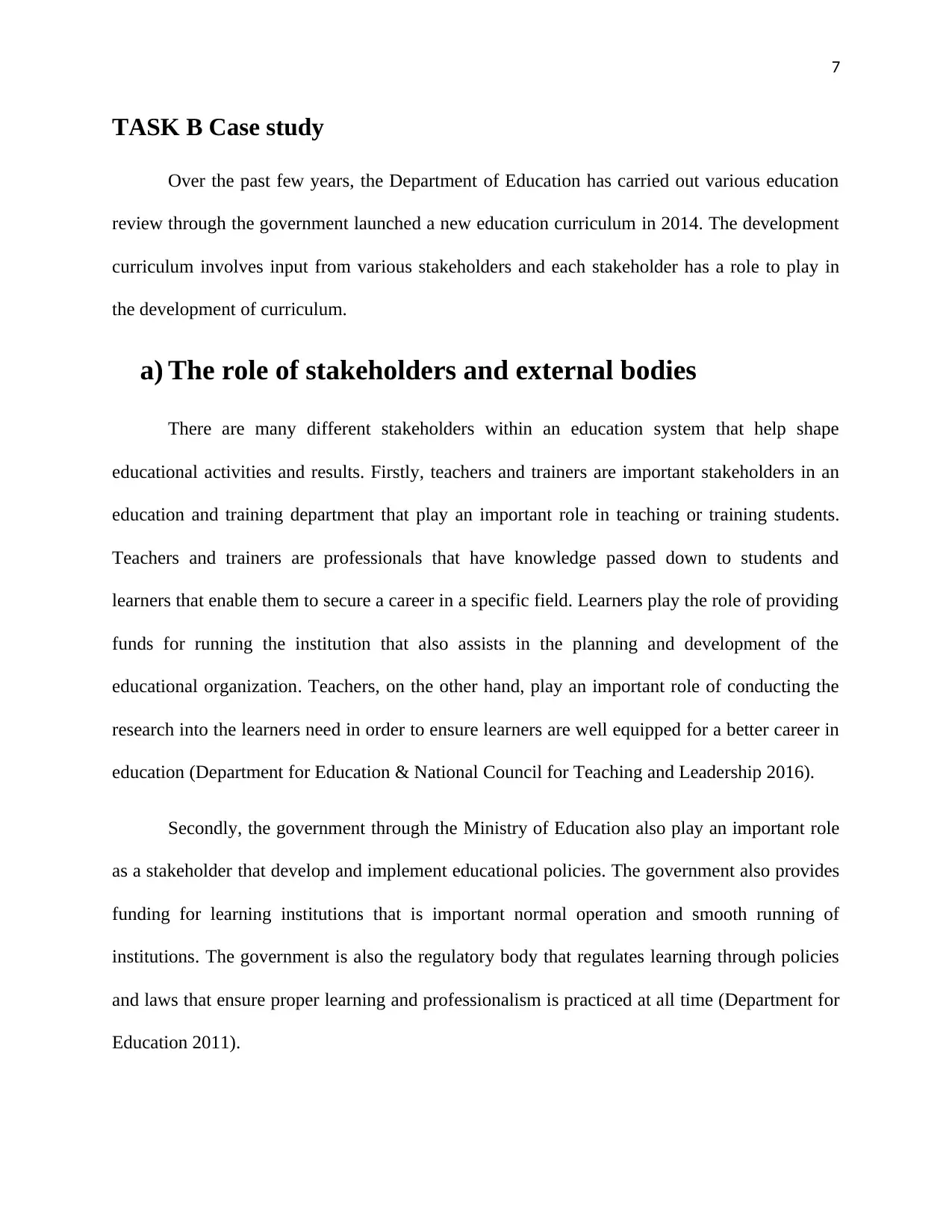
7
TASK B Case study
Over the past few years, the Department of Education has carried out various education
review through the government launched a new education curriculum in 2014. The development
curriculum involves input from various stakeholders and each stakeholder has a role to play in
the development of curriculum.
a) The role of stakeholders and external bodies
There are many different stakeholders within an education system that help shape
educational activities and results. Firstly, teachers and trainers are important stakeholders in an
education and training department that play an important role in teaching or training students.
Teachers and trainers are professionals that have knowledge passed down to students and
learners that enable them to secure a career in a specific field. Learners play the role of providing
funds for running the institution that also assists in the planning and development of the
educational organization. Teachers, on the other hand, play an important role of conducting the
research into the learners need in order to ensure learners are well equipped for a better career in
education (Department for Education & National Council for Teaching and Leadership 2016).
Secondly, the government through the Ministry of Education also play an important role
as a stakeholder that develop and implement educational policies. The government also provides
funding for learning institutions that is important normal operation and smooth running of
institutions. The government is also the regulatory body that regulates learning through policies
and laws that ensure proper learning and professionalism is practiced at all time (Department for
Education 2011).
TASK B Case study
Over the past few years, the Department of Education has carried out various education
review through the government launched a new education curriculum in 2014. The development
curriculum involves input from various stakeholders and each stakeholder has a role to play in
the development of curriculum.
a) The role of stakeholders and external bodies
There are many different stakeholders within an education system that help shape
educational activities and results. Firstly, teachers and trainers are important stakeholders in an
education and training department that play an important role in teaching or training students.
Teachers and trainers are professionals that have knowledge passed down to students and
learners that enable them to secure a career in a specific field. Learners play the role of providing
funds for running the institution that also assists in the planning and development of the
educational organization. Teachers, on the other hand, play an important role of conducting the
research into the learners need in order to ensure learners are well equipped for a better career in
education (Department for Education & National Council for Teaching and Leadership 2016).
Secondly, the government through the Ministry of Education also play an important role
as a stakeholder that develop and implement educational policies. The government also provides
funding for learning institutions that is important normal operation and smooth running of
institutions. The government is also the regulatory body that regulates learning through policies
and laws that ensure proper learning and professionalism is practiced at all time (Department for
Education 2011).
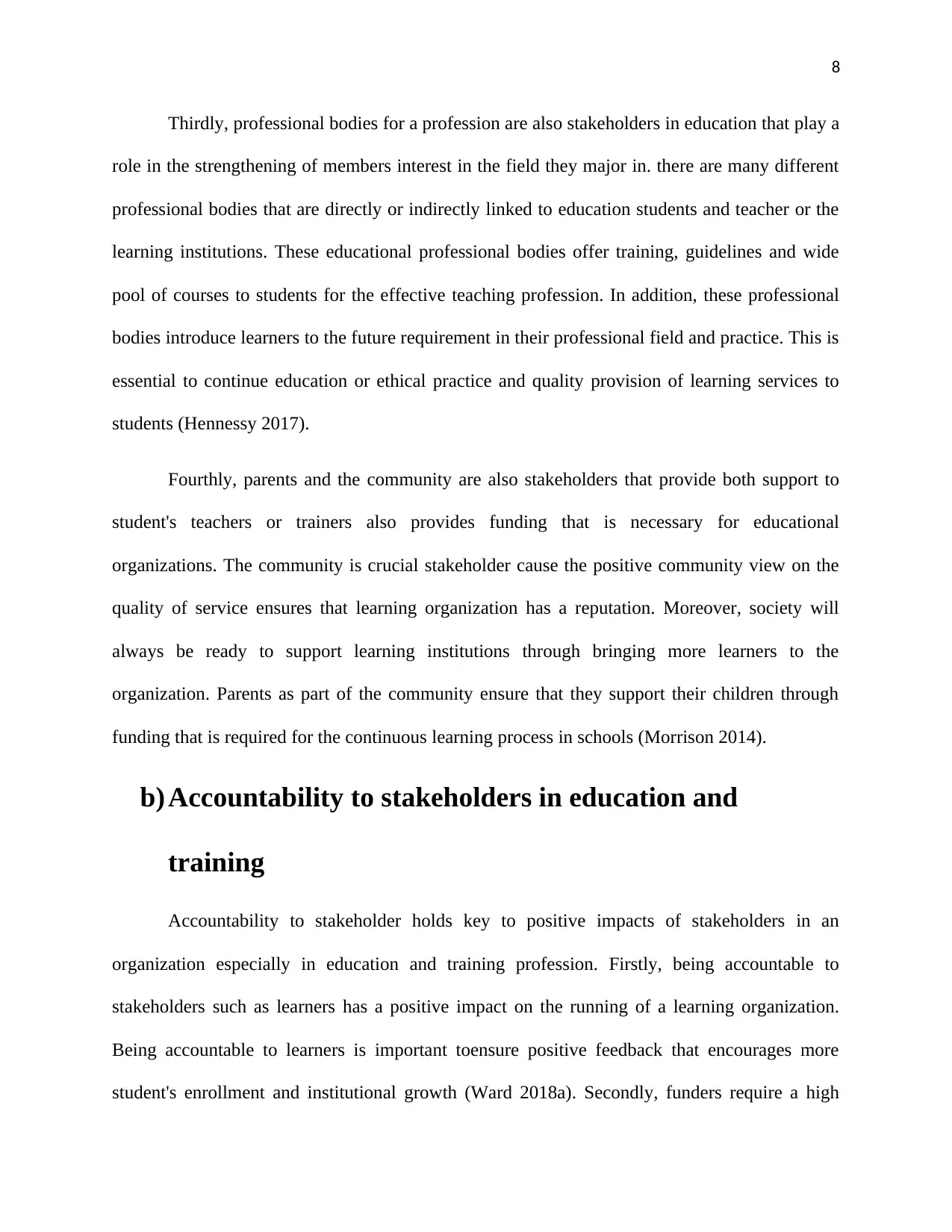
8
Thirdly, professional bodies for a profession are also stakeholders in education that play a
role in the strengthening of members interest in the field they major in. there are many different
professional bodies that are directly or indirectly linked to education students and teacher or the
learning institutions. These educational professional bodies offer training, guidelines and wide
pool of courses to students for the effective teaching profession. In addition, these professional
bodies introduce learners to the future requirement in their professional field and practice. This is
essential to continue education or ethical practice and quality provision of learning services to
students (Hennessy 2017).
Fourthly, parents and the community are also stakeholders that provide both support to
student's teachers or trainers also provides funding that is necessary for educational
organizations. The community is crucial stakeholder cause the positive community view on the
quality of service ensures that learning organization has a reputation. Moreover, society will
always be ready to support learning institutions through bringing more learners to the
organization. Parents as part of the community ensure that they support their children through
funding that is required for the continuous learning process in schools (Morrison 2014).
b) Accountability to stakeholders in education and
training
Accountability to stakeholder holds key to positive impacts of stakeholders in an
organization especially in education and training profession. Firstly, being accountable to
stakeholders such as learners has a positive impact on the running of a learning organization.
Being accountable to learners is important toensure positive feedback that encourages more
student's enrollment and institutional growth (Ward 2018a). Secondly, funders require a high
Thirdly, professional bodies for a profession are also stakeholders in education that play a
role in the strengthening of members interest in the field they major in. there are many different
professional bodies that are directly or indirectly linked to education students and teacher or the
learning institutions. These educational professional bodies offer training, guidelines and wide
pool of courses to students for the effective teaching profession. In addition, these professional
bodies introduce learners to the future requirement in their professional field and practice. This is
essential to continue education or ethical practice and quality provision of learning services to
students (Hennessy 2017).
Fourthly, parents and the community are also stakeholders that provide both support to
student's teachers or trainers also provides funding that is necessary for educational
organizations. The community is crucial stakeholder cause the positive community view on the
quality of service ensures that learning organization has a reputation. Moreover, society will
always be ready to support learning institutions through bringing more learners to the
organization. Parents as part of the community ensure that they support their children through
funding that is required for the continuous learning process in schools (Morrison 2014).
b) Accountability to stakeholders in education and
training
Accountability to stakeholder holds key to positive impacts of stakeholders in an
organization especially in education and training profession. Firstly, being accountable to
stakeholders such as learners has a positive impact on the running of a learning organization.
Being accountable to learners is important toensure positive feedback that encourages more
student's enrollment and institutional growth (Ward 2018a). Secondly, funders require a high
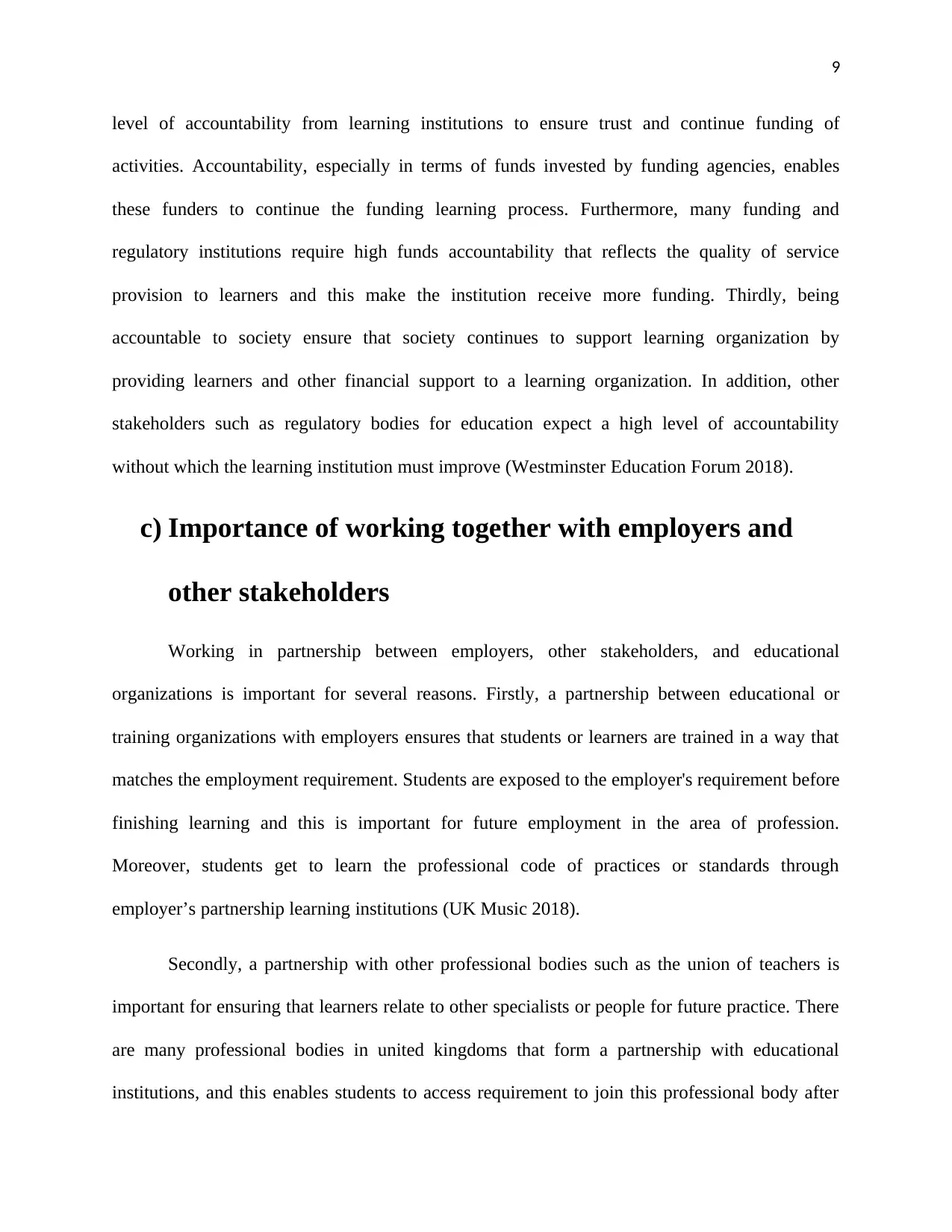
9
level of accountability from learning institutions to ensure trust and continue funding of
activities. Accountability, especially in terms of funds invested by funding agencies, enables
these funders to continue the funding learning process. Furthermore, many funding and
regulatory institutions require high funds accountability that reflects the quality of service
provision to learners and this make the institution receive more funding. Thirdly, being
accountable to society ensure that society continues to support learning organization by
providing learners and other financial support to a learning organization. In addition, other
stakeholders such as regulatory bodies for education expect a high level of accountability
without which the learning institution must improve (Westminster Education Forum 2018).
c) Importance of working together with employers and
other stakeholders
Working in partnership between employers, other stakeholders, and educational
organizations is important for several reasons. Firstly, a partnership between educational or
training organizations with employers ensures that students or learners are trained in a way that
matches the employment requirement. Students are exposed to the employer's requirement before
finishing learning and this is important for future employment in the area of profession.
Moreover, students get to learn the professional code of practices or standards through
employer’s partnership learning institutions (UK Music 2018).
Secondly, a partnership with other professional bodies such as the union of teachers is
important for ensuring that learners relate to other specialists or people for future practice. There
are many professional bodies in united kingdoms that form a partnership with educational
institutions, and this enables students to access requirement to join this professional body after
level of accountability from learning institutions to ensure trust and continue funding of
activities. Accountability, especially in terms of funds invested by funding agencies, enables
these funders to continue the funding learning process. Furthermore, many funding and
regulatory institutions require high funds accountability that reflects the quality of service
provision to learners and this make the institution receive more funding. Thirdly, being
accountable to society ensure that society continues to support learning organization by
providing learners and other financial support to a learning organization. In addition, other
stakeholders such as regulatory bodies for education expect a high level of accountability
without which the learning institution must improve (Westminster Education Forum 2018).
c) Importance of working together with employers and
other stakeholders
Working in partnership between employers, other stakeholders, and educational
organizations is important for several reasons. Firstly, a partnership between educational or
training organizations with employers ensures that students or learners are trained in a way that
matches the employment requirement. Students are exposed to the employer's requirement before
finishing learning and this is important for future employment in the area of profession.
Moreover, students get to learn the professional code of practices or standards through
employer’s partnership learning institutions (UK Music 2018).
Secondly, a partnership with other professional bodies such as the union of teachers is
important for ensuring that learners relate to other specialists or people for future practice. There
are many professional bodies in united kingdoms that form a partnership with educational
institutions, and this enables students to access requirement to join this professional body after
Secure Best Marks with AI Grader
Need help grading? Try our AI Grader for instant feedback on your assignments.
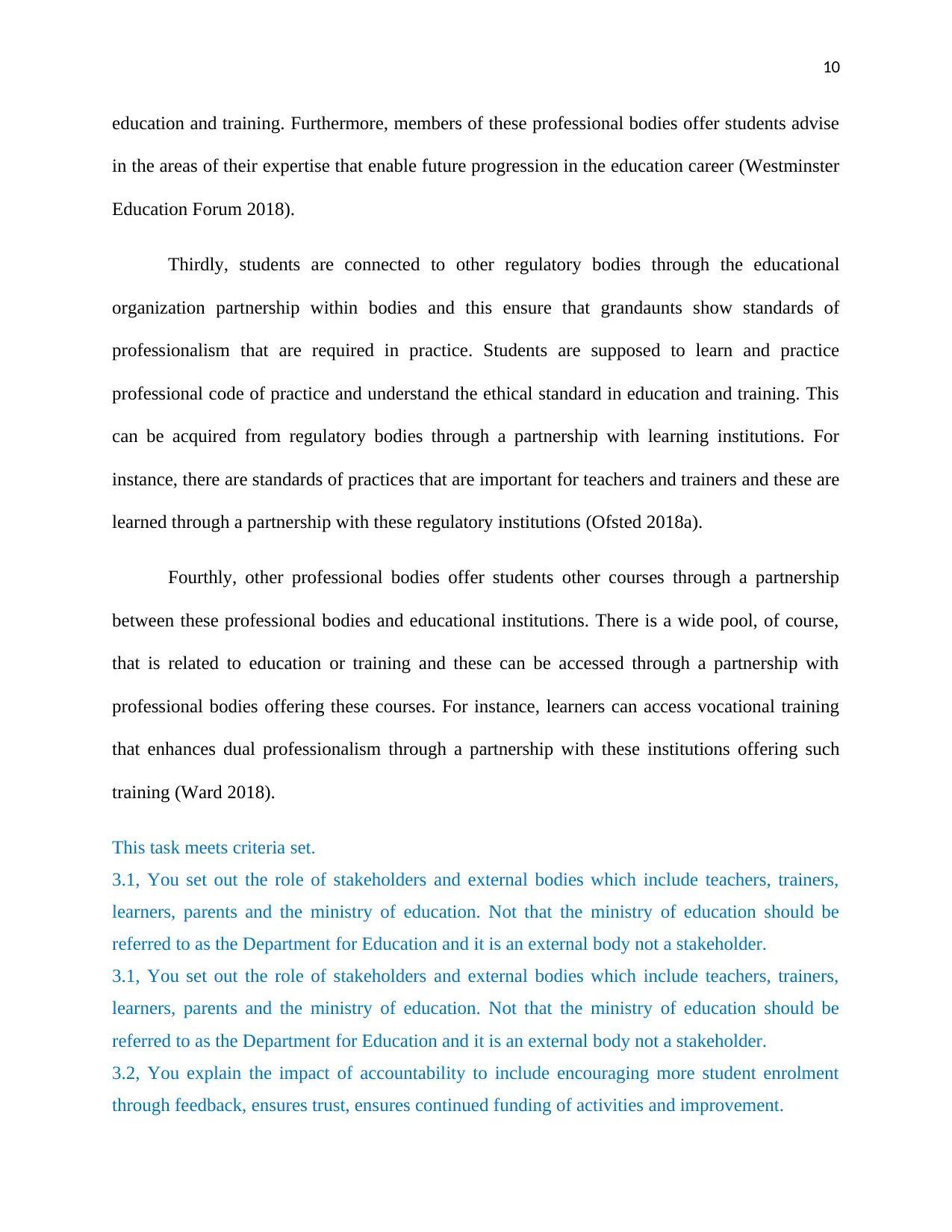
10
education and training. Furthermore, members of these professional bodies offer students advise
in the areas of their expertise that enable future progression in the education career (Westminster
Education Forum 2018).
Thirdly, students are connected to other regulatory bodies through the educational
organization partnership within bodies and this ensure that grandaunts show standards of
professionalism that are required in practice. Students are supposed to learn and practice
professional code of practice and understand the ethical standard in education and training. This
can be acquired from regulatory bodies through a partnership with learning institutions. For
instance, there are standards of practices that are important for teachers and trainers and these are
learned through a partnership with these regulatory institutions (Ofsted 2018a).
Fourthly, other professional bodies offer students other courses through a partnership
between these professional bodies and educational institutions. There is a wide pool, of course,
that is related to education or training and these can be accessed through a partnership with
professional bodies offering these courses. For instance, learners can access vocational training
that enhances dual professionalism through a partnership with these institutions offering such
training (Ward 2018).
This task meets criteria set.
3.1, You set out the role of stakeholders and external bodies which include teachers, trainers,
learners, parents and the ministry of education. Not that the ministry of education should be
referred to as the Department for Education and it is an external body not a stakeholder.
3.1, You set out the role of stakeholders and external bodies which include teachers, trainers,
learners, parents and the ministry of education. Not that the ministry of education should be
referred to as the Department for Education and it is an external body not a stakeholder.
3.2, You explain the impact of accountability to include encouraging more student enrolment
through feedback, ensures trust, ensures continued funding of activities and improvement.
education and training. Furthermore, members of these professional bodies offer students advise
in the areas of their expertise that enable future progression in the education career (Westminster
Education Forum 2018).
Thirdly, students are connected to other regulatory bodies through the educational
organization partnership within bodies and this ensure that grandaunts show standards of
professionalism that are required in practice. Students are supposed to learn and practice
professional code of practice and understand the ethical standard in education and training. This
can be acquired from regulatory bodies through a partnership with learning institutions. For
instance, there are standards of practices that are important for teachers and trainers and these are
learned through a partnership with these regulatory institutions (Ofsted 2018a).
Fourthly, other professional bodies offer students other courses through a partnership
between these professional bodies and educational institutions. There is a wide pool, of course,
that is related to education or training and these can be accessed through a partnership with
professional bodies offering these courses. For instance, learners can access vocational training
that enhances dual professionalism through a partnership with these institutions offering such
training (Ward 2018).
This task meets criteria set.
3.1, You set out the role of stakeholders and external bodies which include teachers, trainers,
learners, parents and the ministry of education. Not that the ministry of education should be
referred to as the Department for Education and it is an external body not a stakeholder.
3.1, You set out the role of stakeholders and external bodies which include teachers, trainers,
learners, parents and the ministry of education. Not that the ministry of education should be
referred to as the Department for Education and it is an external body not a stakeholder.
3.2, You explain the impact of accountability to include encouraging more student enrolment
through feedback, ensures trust, ensures continued funding of activities and improvement.
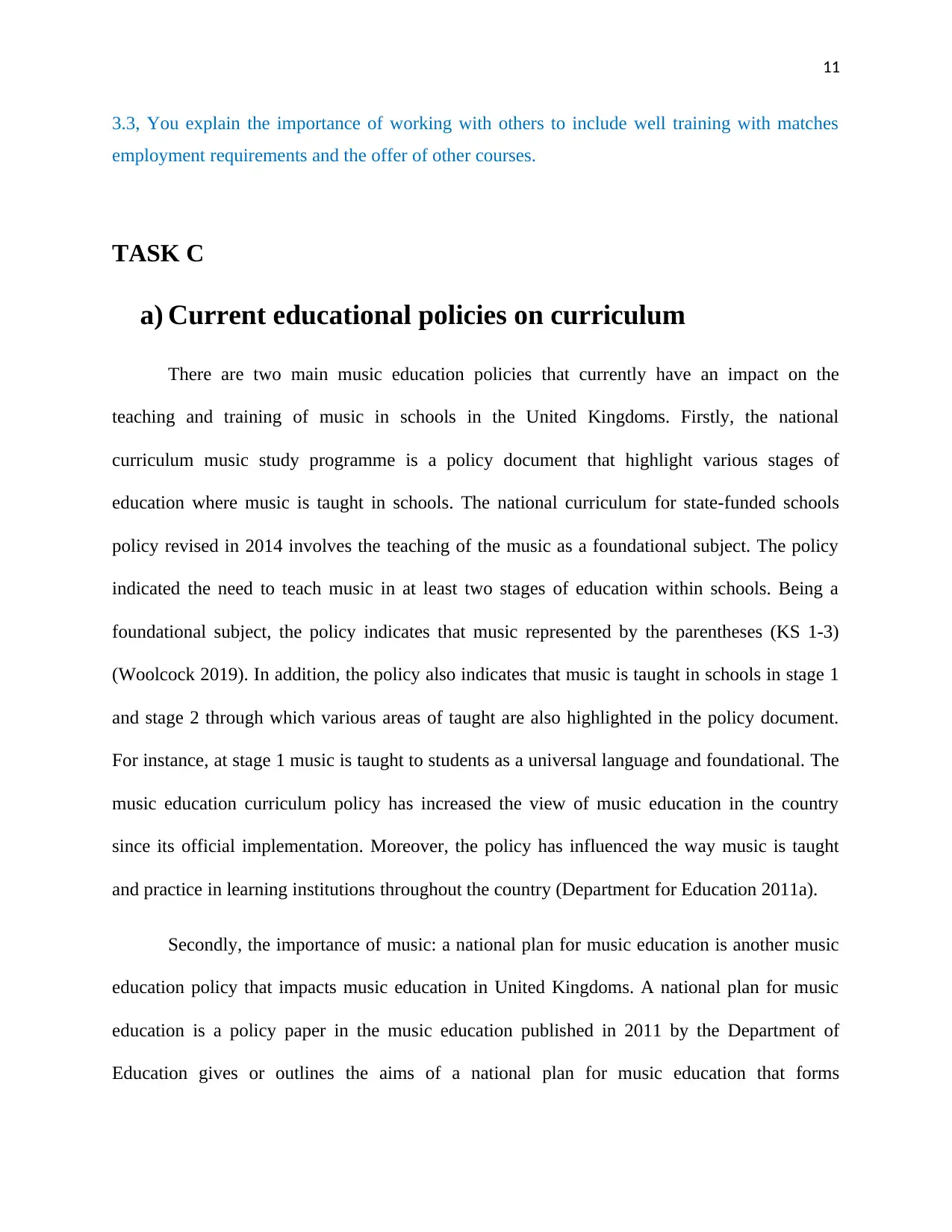
11
3.3, You explain the importance of working with others to include well training with matches
employment requirements and the offer of other courses.
TASK C
a) Current educational policies on curriculum
There are two main music education policies that currently have an impact on the
teaching and training of music in schools in the United Kingdoms. Firstly, the national
curriculum music study programme is a policy document that highlight various stages of
education where music is taught in schools. The national curriculum for state-funded schools
policy revised in 2014 involves the teaching of the music as a foundational subject. The policy
indicated the need to teach music in at least two stages of education within schools. Being a
foundational subject, the policy indicates that music represented by the parentheses (KS 1-3)
(Woolcock 2019). In addition, the policy also indicates that music is taught in schools in stage 1
and stage 2 through which various areas of taught are also highlighted in the policy document.
For instance, at stage 1 music is taught to students as a universal language and foundational. The
music education curriculum policy has increased the view of music education in the country
since its official implementation. Moreover, the policy has influenced the way music is taught
and practice in learning institutions throughout the country (Department for Education 2011a).
Secondly, the importance of music: a national plan for music education is another music
education policy that impacts music education in United Kingdoms. A national plan for music
education is a policy paper in the music education published in 2011 by the Department of
Education gives or outlines the aims of a national plan for music education that forms
3.3, You explain the importance of working with others to include well training with matches
employment requirements and the offer of other courses.
TASK C
a) Current educational policies on curriculum
There are two main music education policies that currently have an impact on the
teaching and training of music in schools in the United Kingdoms. Firstly, the national
curriculum music study programme is a policy document that highlight various stages of
education where music is taught in schools. The national curriculum for state-funded schools
policy revised in 2014 involves the teaching of the music as a foundational subject. The policy
indicated the need to teach music in at least two stages of education within schools. Being a
foundational subject, the policy indicates that music represented by the parentheses (KS 1-3)
(Woolcock 2019). In addition, the policy also indicates that music is taught in schools in stage 1
and stage 2 through which various areas of taught are also highlighted in the policy document.
For instance, at stage 1 music is taught to students as a universal language and foundational. The
music education curriculum policy has increased the view of music education in the country
since its official implementation. Moreover, the policy has influenced the way music is taught
and practice in learning institutions throughout the country (Department for Education 2011a).
Secondly, the importance of music: a national plan for music education is another music
education policy that impacts music education in United Kingdoms. A national plan for music
education is a policy paper in the music education published in 2011 by the Department of
Education gives or outlines the aims of a national plan for music education that forms
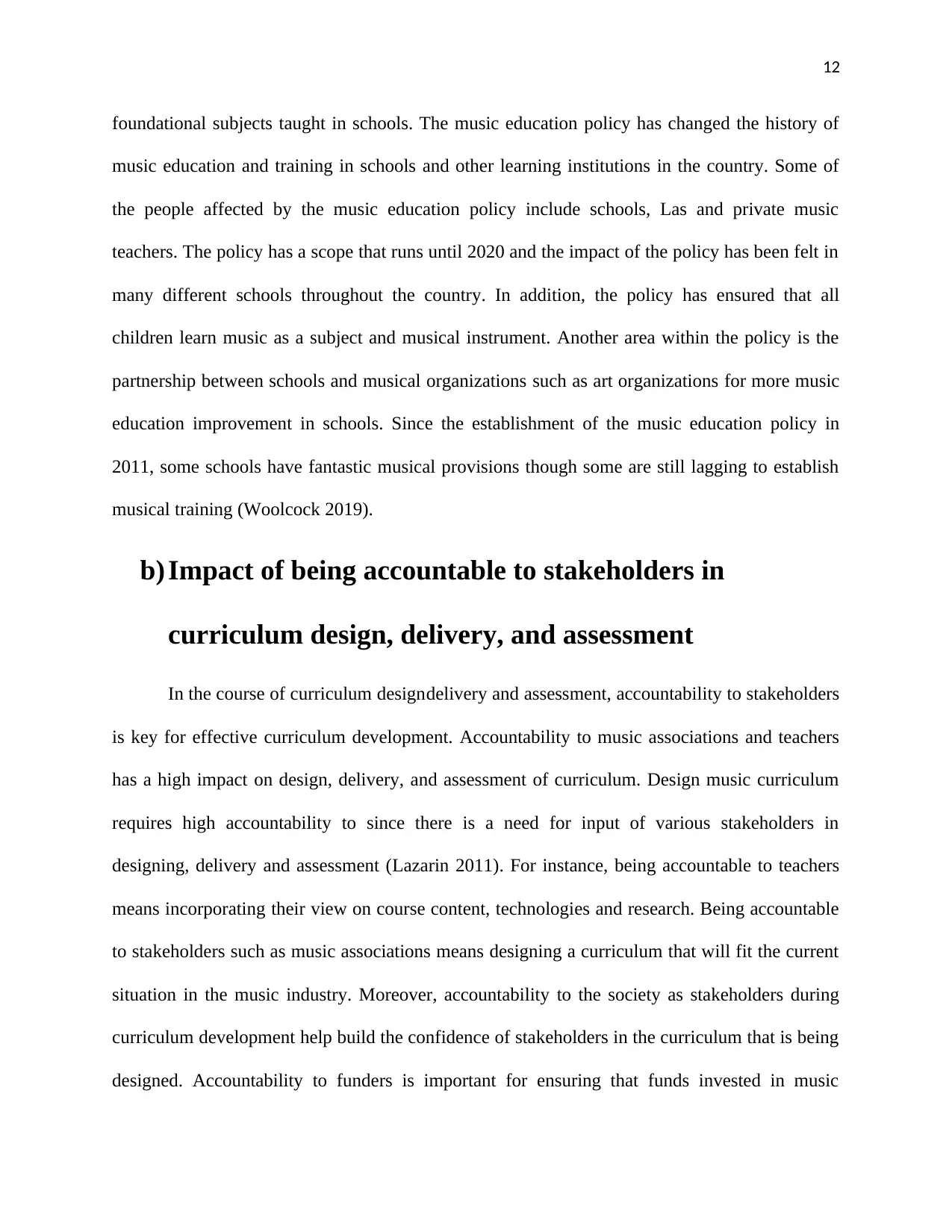
12
foundational subjects taught in schools. The music education policy has changed the history of
music education and training in schools and other learning institutions in the country. Some of
the people affected by the music education policy include schools, Las and private music
teachers. The policy has a scope that runs until 2020 and the impact of the policy has been felt in
many different schools throughout the country. In addition, the policy has ensured that all
children learn music as a subject and musical instrument. Another area within the policy is the
partnership between schools and musical organizations such as art organizations for more music
education improvement in schools. Since the establishment of the music education policy in
2011, some schools have fantastic musical provisions though some are still lagging to establish
musical training (Woolcock 2019).
b) Impact of being accountable to stakeholders in
curriculum design, delivery, and assessment
In the course of curriculum designdelivery and assessment, accountability to stakeholders
is key for effective curriculum development. Accountability to music associations and teachers
has a high impact on design, delivery, and assessment of curriculum. Design music curriculum
requires high accountability to since there is a need for input of various stakeholders in
designing, delivery and assessment (Lazarin 2011). For instance, being accountable to teachers
means incorporating their view on course content, technologies and research. Being accountable
to stakeholders such as music associations means designing a curriculum that will fit the current
situation in the music industry. Moreover, accountability to the society as stakeholders during
curriculum development help build the confidence of stakeholders in the curriculum that is being
designed. Accountability to funders is important for ensuring that funds invested in music
foundational subjects taught in schools. The music education policy has changed the history of
music education and training in schools and other learning institutions in the country. Some of
the people affected by the music education policy include schools, Las and private music
teachers. The policy has a scope that runs until 2020 and the impact of the policy has been felt in
many different schools throughout the country. In addition, the policy has ensured that all
children learn music as a subject and musical instrument. Another area within the policy is the
partnership between schools and musical organizations such as art organizations for more music
education improvement in schools. Since the establishment of the music education policy in
2011, some schools have fantastic musical provisions though some are still lagging to establish
musical training (Woolcock 2019).
b) Impact of being accountable to stakeholders in
curriculum design, delivery, and assessment
In the course of curriculum designdelivery and assessment, accountability to stakeholders
is key for effective curriculum development. Accountability to music associations and teachers
has a high impact on design, delivery, and assessment of curriculum. Design music curriculum
requires high accountability to since there is a need for input of various stakeholders in
designing, delivery and assessment (Lazarin 2011). For instance, being accountable to teachers
means incorporating their view on course content, technologies and research. Being accountable
to stakeholders such as music associations means designing a curriculum that will fit the current
situation in the music industry. Moreover, accountability to the society as stakeholders during
curriculum development help build the confidence of stakeholders in the curriculum that is being
designed. Accountability to funders is important for ensuring that funds invested in music
Paraphrase This Document
Need a fresh take? Get an instant paraphrase of this document with our AI Paraphraser
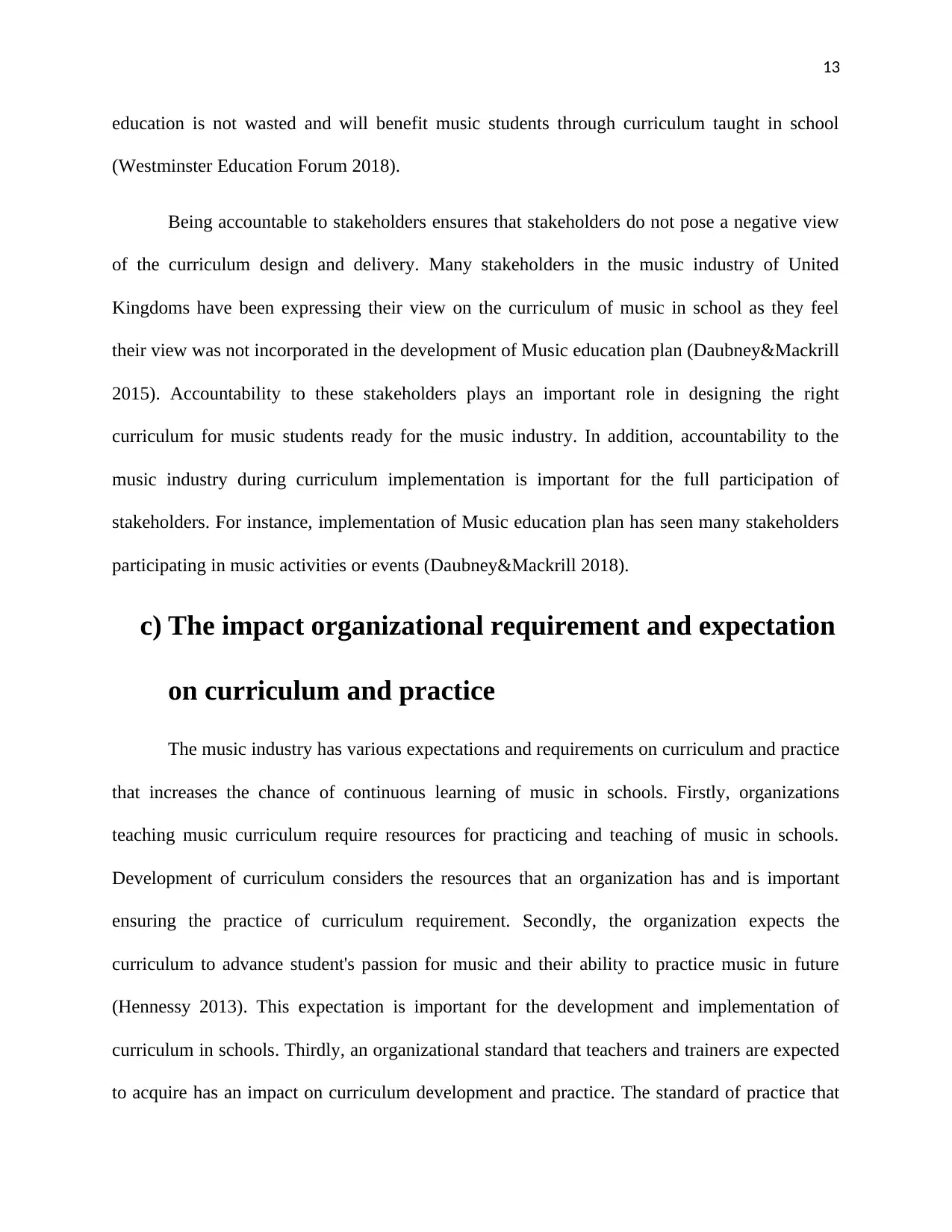
13
education is not wasted and will benefit music students through curriculum taught in school
(Westminster Education Forum 2018).
Being accountable to stakeholders ensures that stakeholders do not pose a negative view
of the curriculum design and delivery. Many stakeholders in the music industry of United
Kingdoms have been expressing their view on the curriculum of music in school as they feel
their view was not incorporated in the development of Music education plan (Daubney&Mackrill
2015). Accountability to these stakeholders plays an important role in designing the right
curriculum for music students ready for the music industry. In addition, accountability to the
music industry during curriculum implementation is important for the full participation of
stakeholders. For instance, implementation of Music education plan has seen many stakeholders
participating in music activities or events (Daubney&Mackrill 2018).
c) The impact organizational requirement and expectation
on curriculum and practice
The music industry has various expectations and requirements on curriculum and practice
that increases the chance of continuous learning of music in schools. Firstly, organizations
teaching music curriculum require resources for practicing and teaching of music in schools.
Development of curriculum considers the resources that an organization has and is important
ensuring the practice of curriculum requirement. Secondly, the organization expects the
curriculum to advance student's passion for music and their ability to practice music in future
(Hennessy 2013). This expectation is important for the development and implementation of
curriculum in schools. Thirdly, an organizational standard that teachers and trainers are expected
to acquire has an impact on curriculum development and practice. The standard of practice that
education is not wasted and will benefit music students through curriculum taught in school
(Westminster Education Forum 2018).
Being accountable to stakeholders ensures that stakeholders do not pose a negative view
of the curriculum design and delivery. Many stakeholders in the music industry of United
Kingdoms have been expressing their view on the curriculum of music in school as they feel
their view was not incorporated in the development of Music education plan (Daubney&Mackrill
2015). Accountability to these stakeholders plays an important role in designing the right
curriculum for music students ready for the music industry. In addition, accountability to the
music industry during curriculum implementation is important for the full participation of
stakeholders. For instance, implementation of Music education plan has seen many stakeholders
participating in music activities or events (Daubney&Mackrill 2018).
c) The impact organizational requirement and expectation
on curriculum and practice
The music industry has various expectations and requirements on curriculum and practice
that increases the chance of continuous learning of music in schools. Firstly, organizations
teaching music curriculum require resources for practicing and teaching of music in schools.
Development of curriculum considers the resources that an organization has and is important
ensuring the practice of curriculum requirement. Secondly, the organization expects the
curriculum to advance student's passion for music and their ability to practice music in future
(Hennessy 2013). This expectation is important for the development and implementation of
curriculum in schools. Thirdly, an organizational standard that teachers and trainers are expected
to acquire has an impact on curriculum development and practice. The standard of practice that
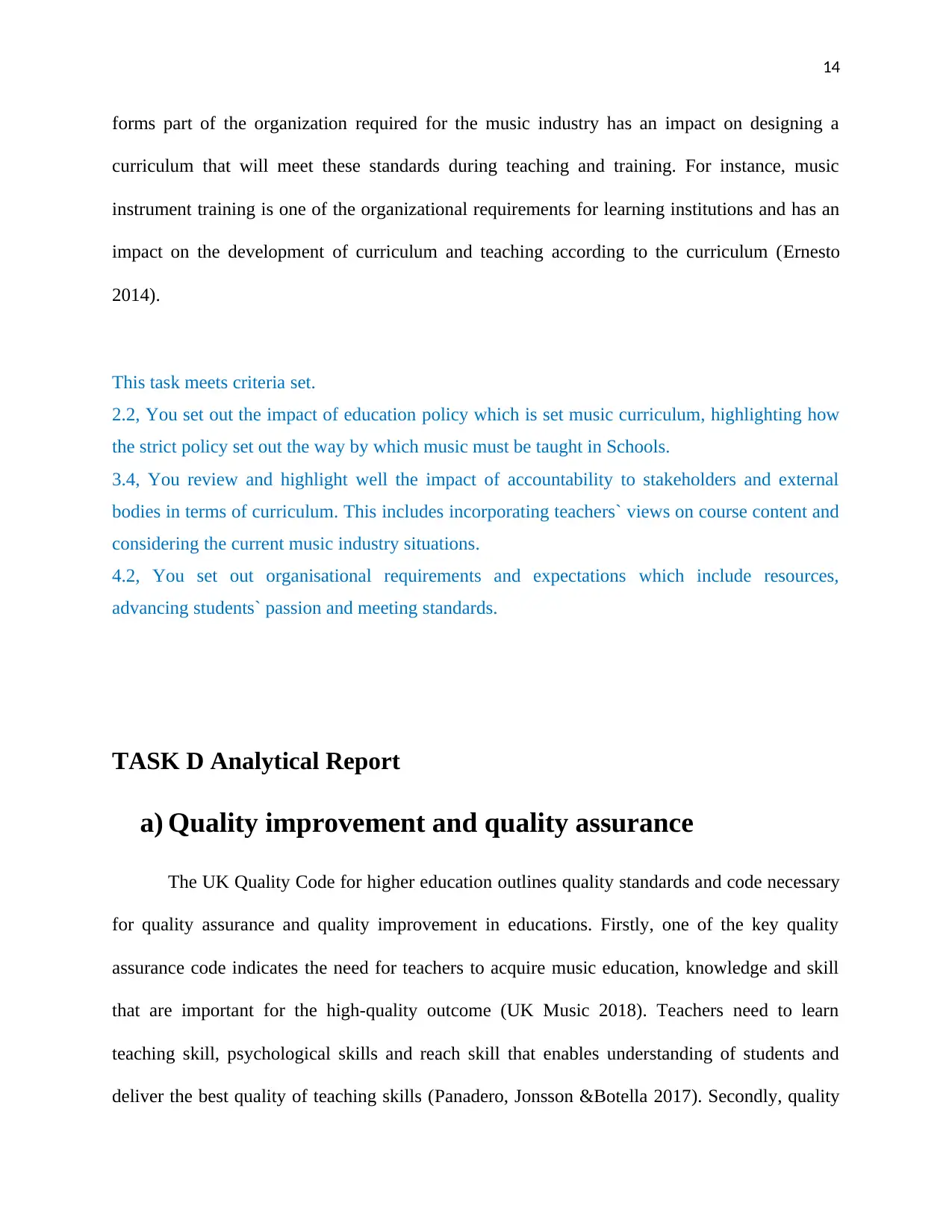
14
forms part of the organization required for the music industry has an impact on designing a
curriculum that will meet these standards during teaching and training. For instance, music
instrument training is one of the organizational requirements for learning institutions and has an
impact on the development of curriculum and teaching according to the curriculum (Ernesto
2014).
This task meets criteria set.
2.2, You set out the impact of education policy which is set music curriculum, highlighting how
the strict policy set out the way by which music must be taught in Schools.
3.4, You review and highlight well the impact of accountability to stakeholders and external
bodies in terms of curriculum. This includes incorporating teachers` views on course content and
considering the current music industry situations.
4.2, You set out organisational requirements and expectations which include resources,
advancing students` passion and meeting standards.
TASK D Analytical Report
a) Quality improvement and quality assurance
The UK Quality Code for higher education outlines quality standards and code necessary
for quality assurance and quality improvement in educations. Firstly, one of the key quality
assurance code indicates the need for teachers to acquire music education, knowledge and skill
that are important for the high-quality outcome (UK Music 2018). Teachers need to learn
teaching skill, psychological skills and reach skill that enables understanding of students and
deliver the best quality of teaching skills (Panadero, Jonsson &Botella 2017). Secondly, quality
forms part of the organization required for the music industry has an impact on designing a
curriculum that will meet these standards during teaching and training. For instance, music
instrument training is one of the organizational requirements for learning institutions and has an
impact on the development of curriculum and teaching according to the curriculum (Ernesto
2014).
This task meets criteria set.
2.2, You set out the impact of education policy which is set music curriculum, highlighting how
the strict policy set out the way by which music must be taught in Schools.
3.4, You review and highlight well the impact of accountability to stakeholders and external
bodies in terms of curriculum. This includes incorporating teachers` views on course content and
considering the current music industry situations.
4.2, You set out organisational requirements and expectations which include resources,
advancing students` passion and meeting standards.
TASK D Analytical Report
a) Quality improvement and quality assurance
The UK Quality Code for higher education outlines quality standards and code necessary
for quality assurance and quality improvement in educations. Firstly, one of the key quality
assurance code indicates the need for teachers to acquire music education, knowledge and skill
that are important for the high-quality outcome (UK Music 2018). Teachers need to learn
teaching skill, psychological skills and reach skill that enables understanding of students and
deliver the best quality of teaching skills (Panadero, Jonsson &Botella 2017). Secondly, quality
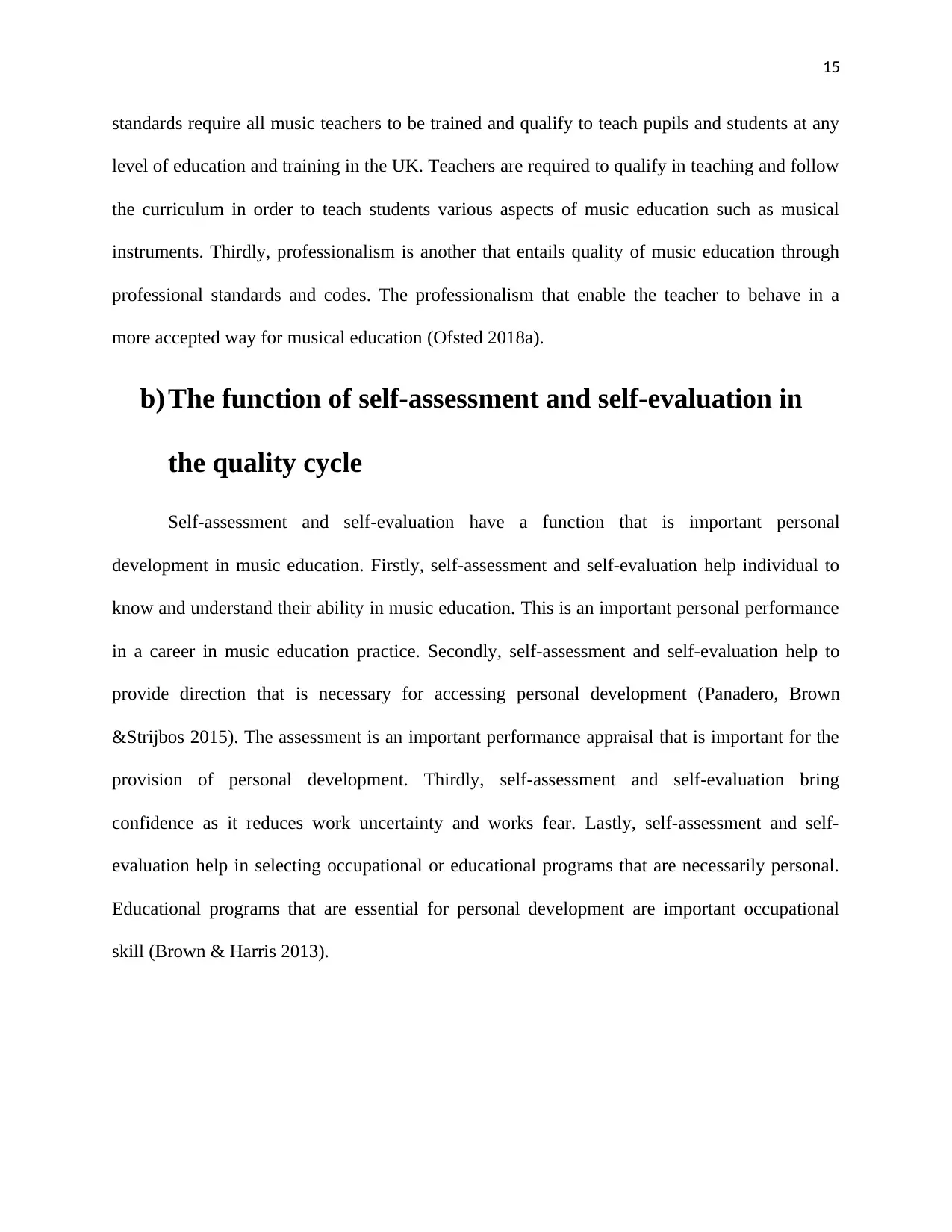
15
standards require all music teachers to be trained and qualify to teach pupils and students at any
level of education and training in the UK. Teachers are required to qualify in teaching and follow
the curriculum in order to teach students various aspects of music education such as musical
instruments. Thirdly, professionalism is another that entails quality of music education through
professional standards and codes. The professionalism that enable the teacher to behave in a
more accepted way for musical education (Ofsted 2018a).
b) The function of self-assessment and self-evaluation in
the quality cycle
Self-assessment and self-evaluation have a function that is important personal
development in music education. Firstly, self-assessment and self-evaluation help individual to
know and understand their ability in music education. This is an important personal performance
in a career in music education practice. Secondly, self-assessment and self-evaluation help to
provide direction that is necessary for accessing personal development (Panadero, Brown
&Strijbos 2015). The assessment is an important performance appraisal that is important for the
provision of personal development. Thirdly, self-assessment and self-evaluation bring
confidence as it reduces work uncertainty and works fear. Lastly, self-assessment and self-
evaluation help in selecting occupational or educational programs that are necessarily personal.
Educational programs that are essential for personal development are important occupational
skill (Brown & Harris 2013).
standards require all music teachers to be trained and qualify to teach pupils and students at any
level of education and training in the UK. Teachers are required to qualify in teaching and follow
the curriculum in order to teach students various aspects of music education such as musical
instruments. Thirdly, professionalism is another that entails quality of music education through
professional standards and codes. The professionalism that enable the teacher to behave in a
more accepted way for musical education (Ofsted 2018a).
b) The function of self-assessment and self-evaluation in
the quality cycle
Self-assessment and self-evaluation have a function that is important personal
development in music education. Firstly, self-assessment and self-evaluation help individual to
know and understand their ability in music education. This is an important personal performance
in a career in music education practice. Secondly, self-assessment and self-evaluation help to
provide direction that is necessary for accessing personal development (Panadero, Brown
&Strijbos 2015). The assessment is an important performance appraisal that is important for the
provision of personal development. Thirdly, self-assessment and self-evaluation bring
confidence as it reduces work uncertainty and works fear. Lastly, self-assessment and self-
evaluation help in selecting occupational or educational programs that are necessarily personal.
Educational programs that are essential for personal development are important occupational
skill (Brown & Harris 2013).
Secure Best Marks with AI Grader
Need help grading? Try our AI Grader for instant feedback on your assignments.
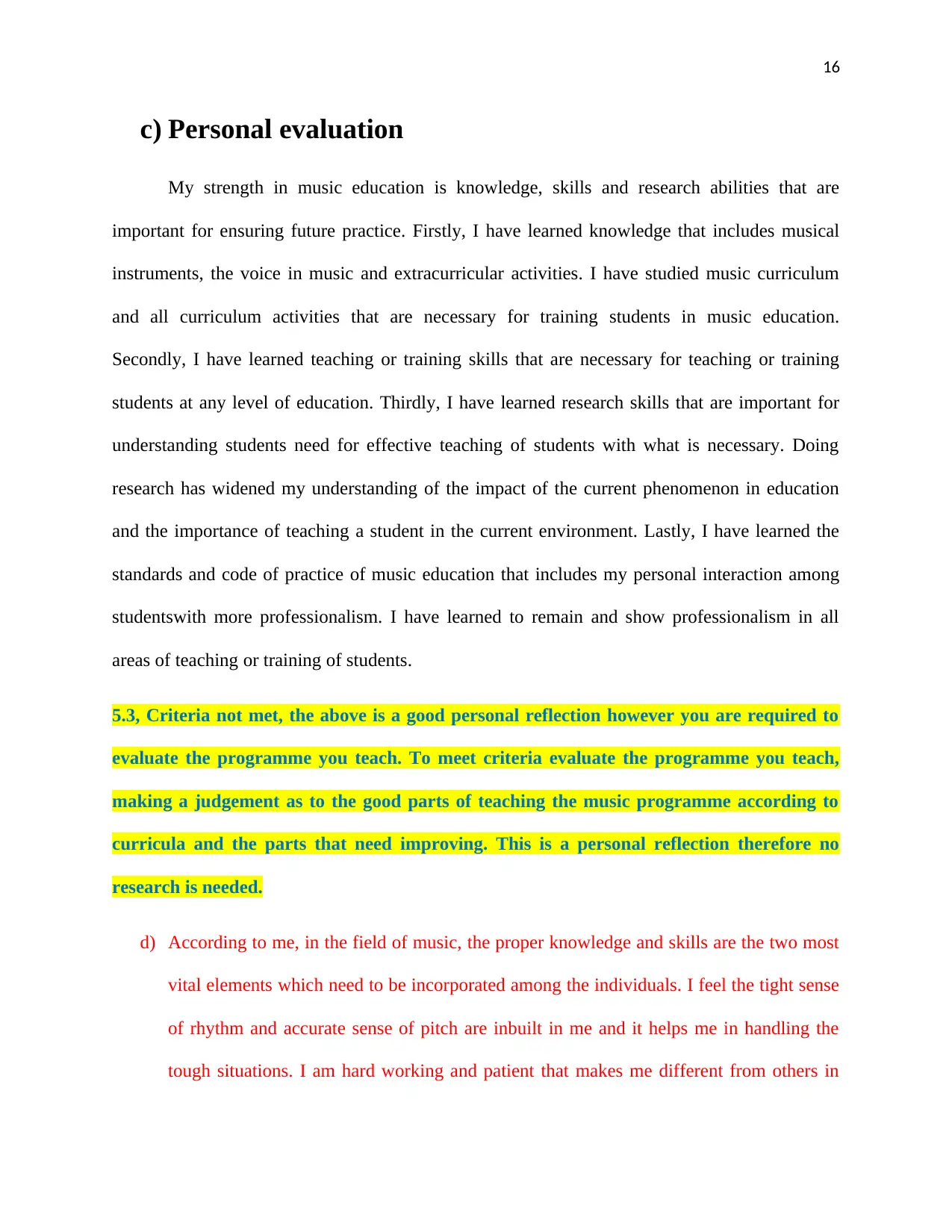
16
c) Personal evaluation
My strength in music education is knowledge, skills and research abilities that are
important for ensuring future practice. Firstly, I have learned knowledge that includes musical
instruments, the voice in music and extracurricular activities. I have studied music curriculum
and all curriculum activities that are necessary for training students in music education.
Secondly, I have learned teaching or training skills that are necessary for teaching or training
students at any level of education. Thirdly, I have learned research skills that are important for
understanding students need for effective teaching of students with what is necessary. Doing
research has widened my understanding of the impact of the current phenomenon in education
and the importance of teaching a student in the current environment. Lastly, I have learned the
standards and code of practice of music education that includes my personal interaction among
studentswith more professionalism. I have learned to remain and show professionalism in all
areas of teaching or training of students.
5.3, Criteria not met, the above is a good personal reflection however you are required to
evaluate the programme you teach. To meet criteria evaluate the programme you teach,
making a judgement as to the good parts of teaching the music programme according to
curricula and the parts that need improving. This is a personal reflection therefore no
research is needed.
d) According to me, in the field of music, the proper knowledge and skills are the two most
vital elements which need to be incorporated among the individuals. I feel the tight sense
of rhythm and accurate sense of pitch are inbuilt in me and it helps me in handling the
tough situations. I am hard working and patient that makes me different from others in
c) Personal evaluation
My strength in music education is knowledge, skills and research abilities that are
important for ensuring future practice. Firstly, I have learned knowledge that includes musical
instruments, the voice in music and extracurricular activities. I have studied music curriculum
and all curriculum activities that are necessary for training students in music education.
Secondly, I have learned teaching or training skills that are necessary for teaching or training
students at any level of education. Thirdly, I have learned research skills that are important for
understanding students need for effective teaching of students with what is necessary. Doing
research has widened my understanding of the impact of the current phenomenon in education
and the importance of teaching a student in the current environment. Lastly, I have learned the
standards and code of practice of music education that includes my personal interaction among
studentswith more professionalism. I have learned to remain and show professionalism in all
areas of teaching or training of students.
5.3, Criteria not met, the above is a good personal reflection however you are required to
evaluate the programme you teach. To meet criteria evaluate the programme you teach,
making a judgement as to the good parts of teaching the music programme according to
curricula and the parts that need improving. This is a personal reflection therefore no
research is needed.
d) According to me, in the field of music, the proper knowledge and skills are the two most
vital elements which need to be incorporated among the individuals. I feel the tight sense
of rhythm and accurate sense of pitch are inbuilt in me and it helps me in handling the
tough situations. I am hard working and patient that makes me different from others in
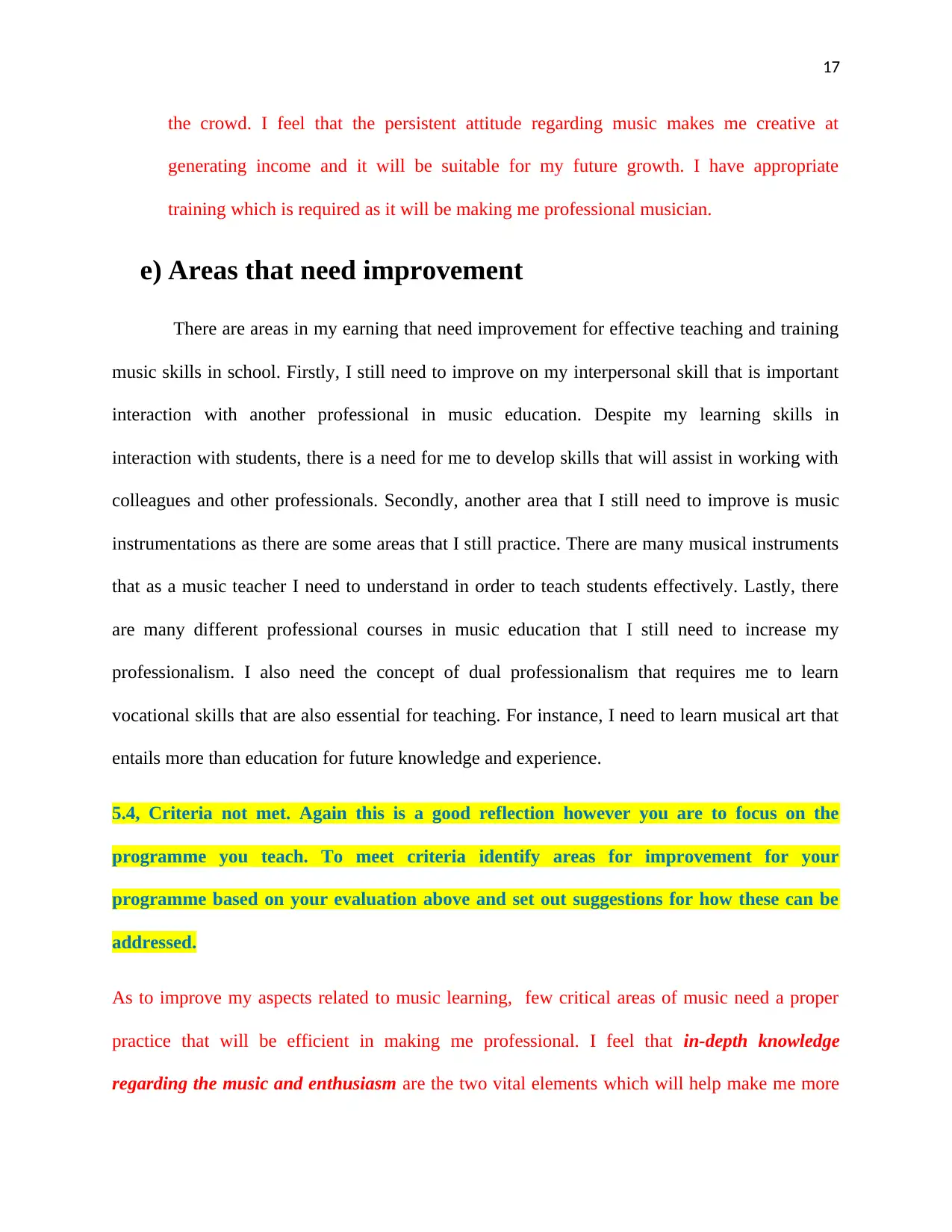
17
the crowd. I feel that the persistent attitude regarding music makes me creative at
generating income and it will be suitable for my future growth. I have appropriate
training which is required as it will be making me professional musician.
e) Areas that need improvement
There are areas in my earning that need improvement for effective teaching and training
music skills in school. Firstly, I still need to improve on my interpersonal skill that is important
interaction with another professional in music education. Despite my learning skills in
interaction with students, there is a need for me to develop skills that will assist in working with
colleagues and other professionals. Secondly, another area that I still need to improve is music
instrumentations as there are some areas that I still practice. There are many musical instruments
that as a music teacher I need to understand in order to teach students effectively. Lastly, there
are many different professional courses in music education that I still need to increase my
professionalism. I also need the concept of dual professionalism that requires me to learn
vocational skills that are also essential for teaching. For instance, I need to learn musical art that
entails more than education for future knowledge and experience.
5.4, Criteria not met. Again this is a good reflection however you are to focus on the
programme you teach. To meet criteria identify areas for improvement for your
programme based on your evaluation above and set out suggestions for how these can be
addressed.
As to improve my aspects related to music learning, few critical areas of music need a proper
practice that will be efficient in making me professional. I feel that in-depth knowledge
regarding the music and enthusiasm are the two vital elements which will help make me more
the crowd. I feel that the persistent attitude regarding music makes me creative at
generating income and it will be suitable for my future growth. I have appropriate
training which is required as it will be making me professional musician.
e) Areas that need improvement
There are areas in my earning that need improvement for effective teaching and training
music skills in school. Firstly, I still need to improve on my interpersonal skill that is important
interaction with another professional in music education. Despite my learning skills in
interaction with students, there is a need for me to develop skills that will assist in working with
colleagues and other professionals. Secondly, another area that I still need to improve is music
instrumentations as there are some areas that I still practice. There are many musical instruments
that as a music teacher I need to understand in order to teach students effectively. Lastly, there
are many different professional courses in music education that I still need to increase my
professionalism. I also need the concept of dual professionalism that requires me to learn
vocational skills that are also essential for teaching. For instance, I need to learn musical art that
entails more than education for future knowledge and experience.
5.4, Criteria not met. Again this is a good reflection however you are to focus on the
programme you teach. To meet criteria identify areas for improvement for your
programme based on your evaluation above and set out suggestions for how these can be
addressed.
As to improve my aspects related to music learning, few critical areas of music need a proper
practice that will be efficient in making me professional. I feel that in-depth knowledge
regarding the music and enthusiasm are the two vital elements which will help make me more
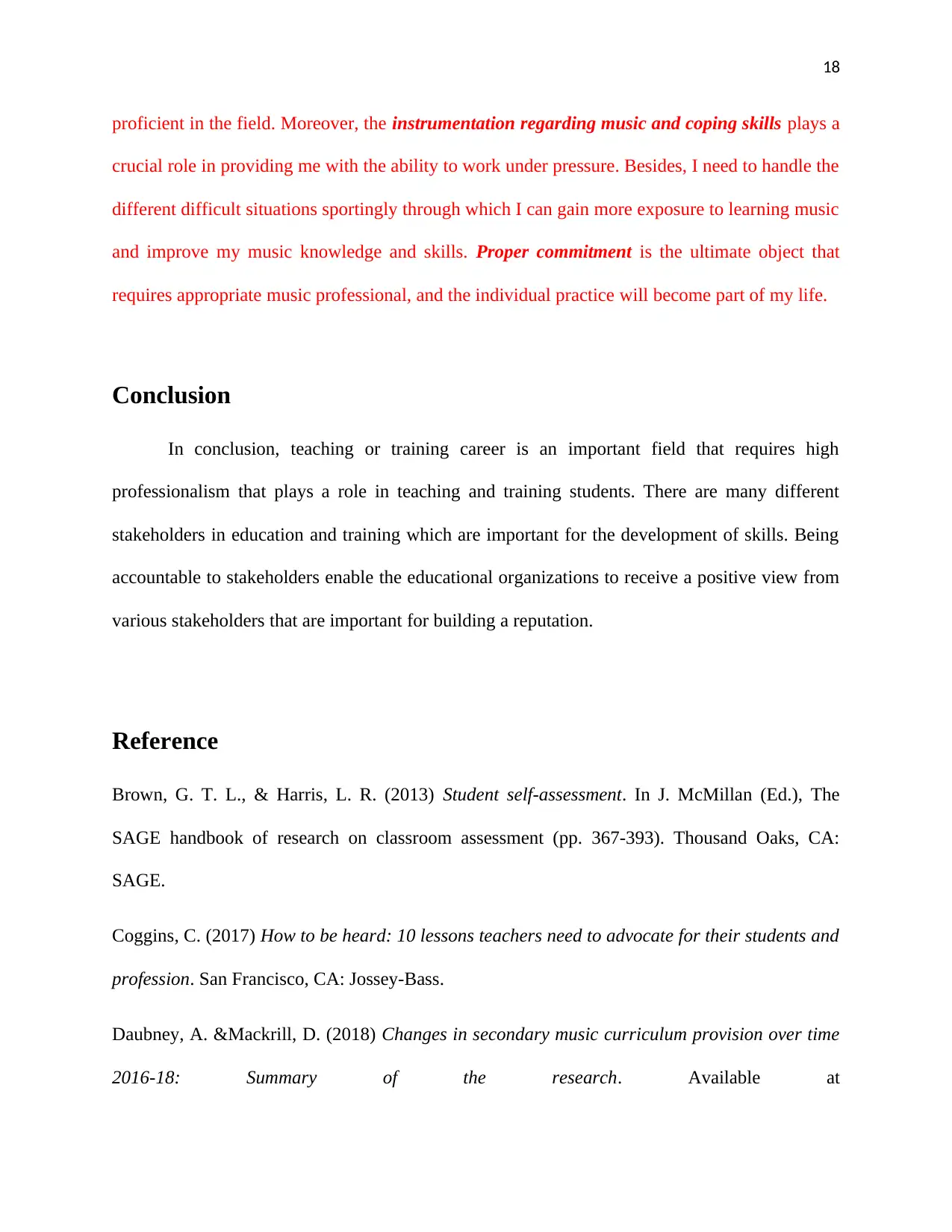
18
proficient in the field. Moreover, the instrumentation regarding music and coping skills plays a
crucial role in providing me with the ability to work under pressure. Besides, I need to handle the
different difficult situations sportingly through which I can gain more exposure to learning music
and improve my music knowledge and skills. Proper commitment is the ultimate object that
requires appropriate music professional, and the individual practice will become part of my life.
Conclusion
In conclusion, teaching or training career is an important field that requires high
professionalism that plays a role in teaching and training students. There are many different
stakeholders in education and training which are important for the development of skills. Being
accountable to stakeholders enable the educational organizations to receive a positive view from
various stakeholders that are important for building a reputation.
Reference
Brown, G. T. L., & Harris, L. R. (2013) Student self-assessment. In J. McMillan (Ed.), The
SAGE handbook of research on classroom assessment (pp. 367-393). Thousand Oaks, CA:
SAGE.
Coggins, C. (2017) How to be heard: 10 lessons teachers need to advocate for their students and
profession. San Francisco, CA: Jossey-Bass.
Daubney, A. &Mackrill, D. (2018) Changes in secondary music curriculum provision over time
2016-18: Summary of the research. Available at
proficient in the field. Moreover, the instrumentation regarding music and coping skills plays a
crucial role in providing me with the ability to work under pressure. Besides, I need to handle the
different difficult situations sportingly through which I can gain more exposure to learning music
and improve my music knowledge and skills. Proper commitment is the ultimate object that
requires appropriate music professional, and the individual practice will become part of my life.
Conclusion
In conclusion, teaching or training career is an important field that requires high
professionalism that plays a role in teaching and training students. There are many different
stakeholders in education and training which are important for the development of skills. Being
accountable to stakeholders enable the educational organizations to receive a positive view from
various stakeholders that are important for building a reputation.
Reference
Brown, G. T. L., & Harris, L. R. (2013) Student self-assessment. In J. McMillan (Ed.), The
SAGE handbook of research on classroom assessment (pp. 367-393). Thousand Oaks, CA:
SAGE.
Coggins, C. (2017) How to be heard: 10 lessons teachers need to advocate for their students and
profession. San Francisco, CA: Jossey-Bass.
Daubney, A. &Mackrill, D. (2018) Changes in secondary music curriculum provision over time
2016-18: Summary of the research. Available at
Paraphrase This Document
Need a fresh take? Get an instant paraphrase of this document with our AI Paraphraser
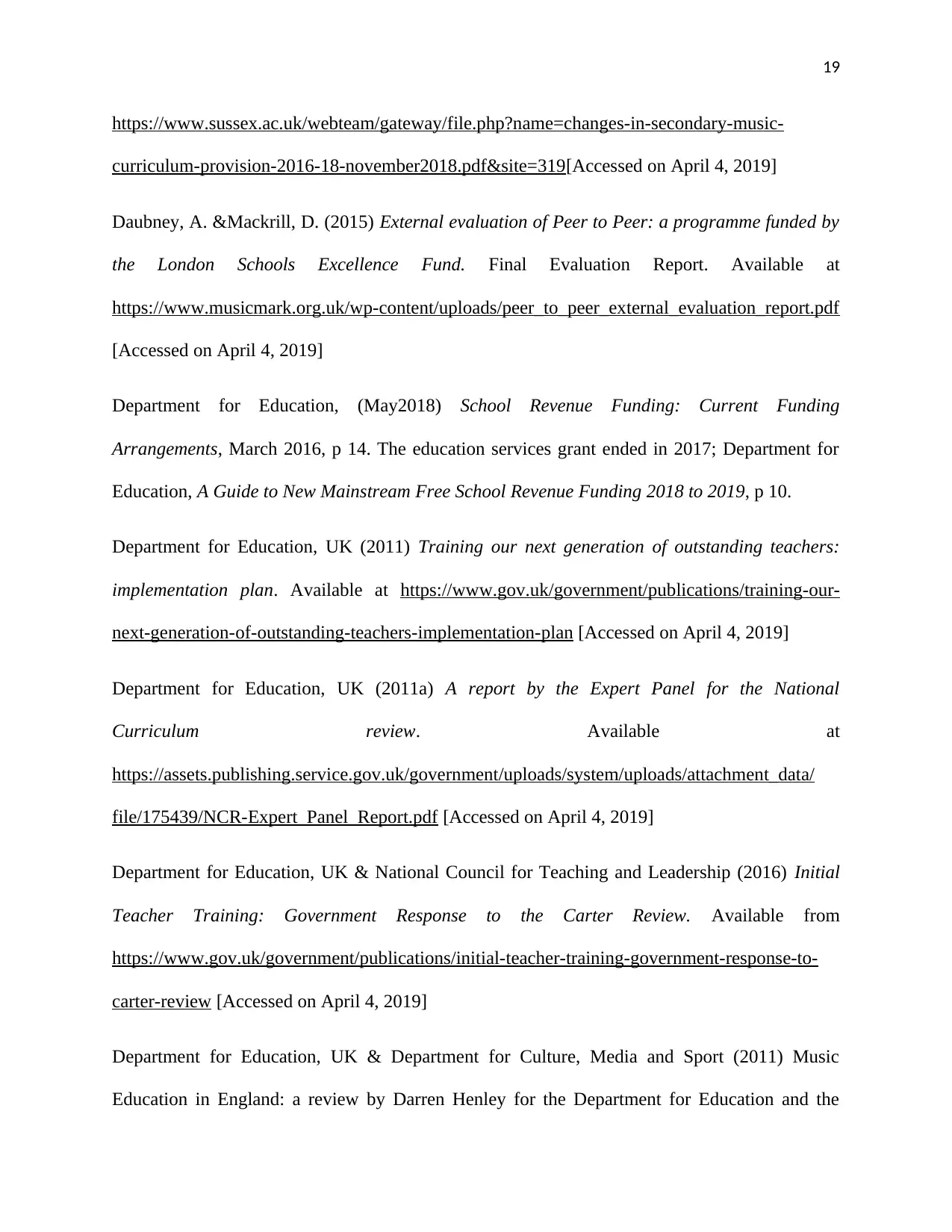
19
https://www.sussex.ac.uk/webteam/gateway/file.php?name=changes-in-secondary-music-
curriculum-provision-2016-18-november2018.pdf&site=319[Accessed on April 4, 2019]
Daubney, A. &Mackrill, D. (2015) External evaluation of Peer to Peer: a programme funded by
the London Schools Excellence Fund. Final Evaluation Report. Available at
https://www.musicmark.org.uk/wp-content/uploads/peer_to_peer_external_evaluation_report.pdf
[Accessed on April 4, 2019]
Department for Education, (May2018) School Revenue Funding: Current Funding
Arrangements, March 2016, p 14. The education services grant ended in 2017; Department for
Education, A Guide to New Mainstream Free School Revenue Funding 2018 to 2019, p 10.
Department for Education, UK (2011) Training our next generation of outstanding teachers:
implementation plan. Available at https://www.gov.uk/government/publications/training-our-
next-generation-of-outstanding-teachers-implementation-plan [Accessed on April 4, 2019]
Department for Education, UK (2011a) A report by the Expert Panel for the National
Curriculum review. Available at
https://assets.publishing.service.gov.uk/government/uploads/system/uploads/attachment_data/
file/175439/NCR-Expert_Panel_Report.pdf [Accessed on April 4, 2019]
Department for Education, UK & National Council for Teaching and Leadership (2016) Initial
Teacher Training: Government Response to the Carter Review. Available from
https://www.gov.uk/government/publications/initial-teacher-training-government-response-to-
carter-review [Accessed on April 4, 2019]
Department for Education, UK & Department for Culture, Media and Sport (2011) Music
Education in England: a review by Darren Henley for the Department for Education and the
https://www.sussex.ac.uk/webteam/gateway/file.php?name=changes-in-secondary-music-
curriculum-provision-2016-18-november2018.pdf&site=319[Accessed on April 4, 2019]
Daubney, A. &Mackrill, D. (2015) External evaluation of Peer to Peer: a programme funded by
the London Schools Excellence Fund. Final Evaluation Report. Available at
https://www.musicmark.org.uk/wp-content/uploads/peer_to_peer_external_evaluation_report.pdf
[Accessed on April 4, 2019]
Department for Education, (May2018) School Revenue Funding: Current Funding
Arrangements, March 2016, p 14. The education services grant ended in 2017; Department for
Education, A Guide to New Mainstream Free School Revenue Funding 2018 to 2019, p 10.
Department for Education, UK (2011) Training our next generation of outstanding teachers:
implementation plan. Available at https://www.gov.uk/government/publications/training-our-
next-generation-of-outstanding-teachers-implementation-plan [Accessed on April 4, 2019]
Department for Education, UK (2011a) A report by the Expert Panel for the National
Curriculum review. Available at
https://assets.publishing.service.gov.uk/government/uploads/system/uploads/attachment_data/
file/175439/NCR-Expert_Panel_Report.pdf [Accessed on April 4, 2019]
Department for Education, UK & National Council for Teaching and Leadership (2016) Initial
Teacher Training: Government Response to the Carter Review. Available from
https://www.gov.uk/government/publications/initial-teacher-training-government-response-to-
carter-review [Accessed on April 4, 2019]
Department for Education, UK & Department for Culture, Media and Sport (2011) Music
Education in England: a review by Darren Henley for the Department for Education and the
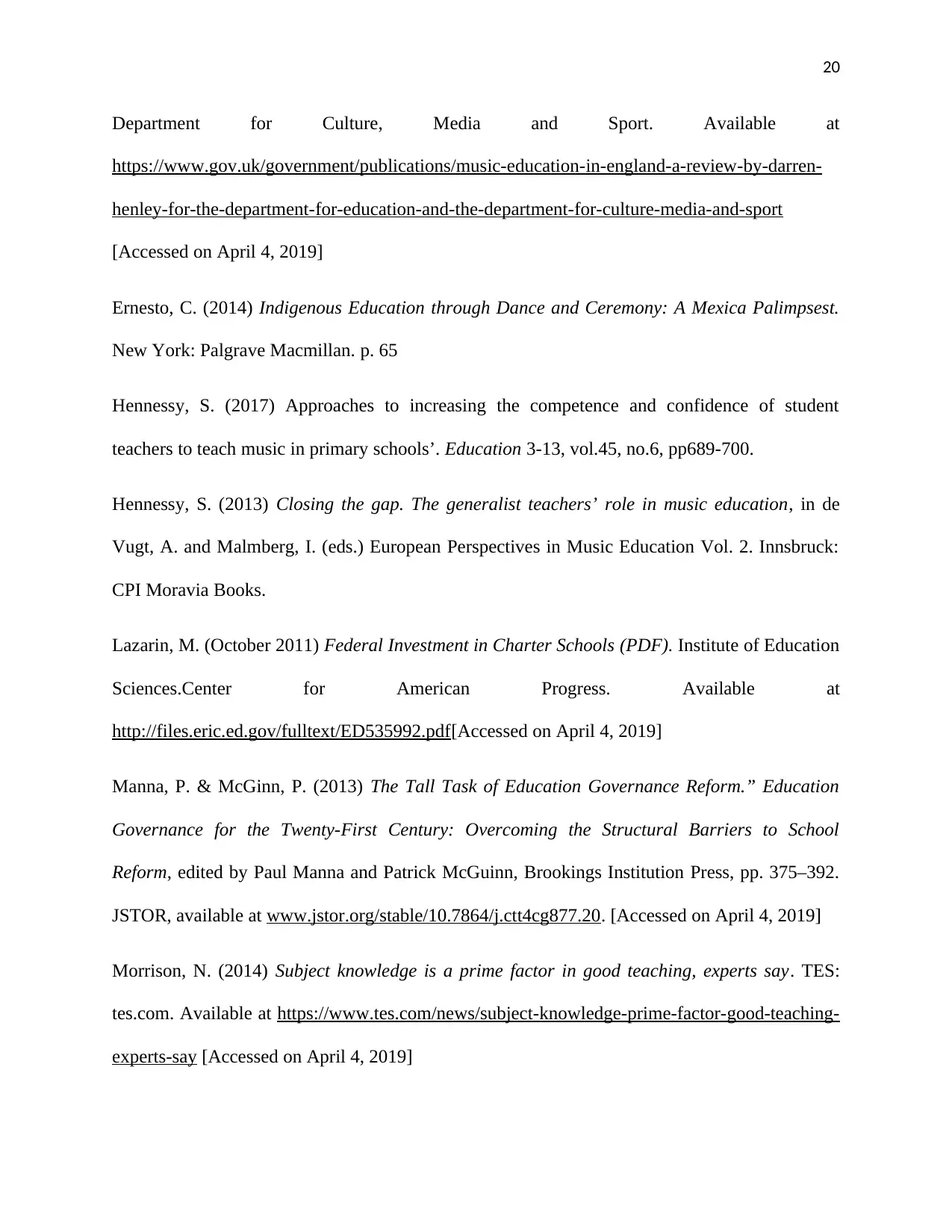
20
Department for Culture, Media and Sport. Available at
https://www.gov.uk/government/publications/music-education-in-england-a-review-by-darren-
henley-for-the-department-for-education-and-the-department-for-culture-media-and-sport
[Accessed on April 4, 2019]
Ernesto, C. (2014) Indigenous Education through Dance and Ceremony: A Mexica Palimpsest.
New York: Palgrave Macmillan. p. 65
Hennessy, S. (2017) Approaches to increasing the competence and confidence of student
teachers to teach music in primary schools’. Education 3-13, vol.45, no.6, pp689-700.
Hennessy, S. (2013) Closing the gap. The generalist teachers’ role in music education, in de
Vugt, A. and Malmberg, I. (eds.) European Perspectives in Music Education Vol. 2. Innsbruck:
CPI Moravia Books.
Lazarin, M. (October 2011) Federal Investment in Charter Schools (PDF). Institute of Education
Sciences.Center for American Progress. Available at
http://files.eric.ed.gov/fulltext/ED535992.pdf[Accessed on April 4, 2019]
Manna, P. & McGinn, P. (2013) The Tall Task of Education Governance Reform.” Education
Governance for the Twenty-First Century: Overcoming the Structural Barriers to School
Reform, edited by Paul Manna and Patrick McGuinn, Brookings Institution Press, pp. 375–392.
JSTOR, available at www.jstor.org/stable/10.7864/j.ctt4cg877.20. [Accessed on April 4, 2019]
Morrison, N. (2014) Subject knowledge is a prime factor in good teaching, experts say. TES:
tes.com. Available at https://www.tes.com/news/subject-knowledge-prime-factor-good-teaching-
experts-say [Accessed on April 4, 2019]
Department for Culture, Media and Sport. Available at
https://www.gov.uk/government/publications/music-education-in-england-a-review-by-darren-
henley-for-the-department-for-education-and-the-department-for-culture-media-and-sport
[Accessed on April 4, 2019]
Ernesto, C. (2014) Indigenous Education through Dance and Ceremony: A Mexica Palimpsest.
New York: Palgrave Macmillan. p. 65
Hennessy, S. (2017) Approaches to increasing the competence and confidence of student
teachers to teach music in primary schools’. Education 3-13, vol.45, no.6, pp689-700.
Hennessy, S. (2013) Closing the gap. The generalist teachers’ role in music education, in de
Vugt, A. and Malmberg, I. (eds.) European Perspectives in Music Education Vol. 2. Innsbruck:
CPI Moravia Books.
Lazarin, M. (October 2011) Federal Investment in Charter Schools (PDF). Institute of Education
Sciences.Center for American Progress. Available at
http://files.eric.ed.gov/fulltext/ED535992.pdf[Accessed on April 4, 2019]
Manna, P. & McGinn, P. (2013) The Tall Task of Education Governance Reform.” Education
Governance for the Twenty-First Century: Overcoming the Structural Barriers to School
Reform, edited by Paul Manna and Patrick McGuinn, Brookings Institution Press, pp. 375–392.
JSTOR, available at www.jstor.org/stable/10.7864/j.ctt4cg877.20. [Accessed on April 4, 2019]
Morrison, N. (2014) Subject knowledge is a prime factor in good teaching, experts say. TES:
tes.com. Available at https://www.tes.com/news/subject-knowledge-prime-factor-good-teaching-
experts-say [Accessed on April 4, 2019]
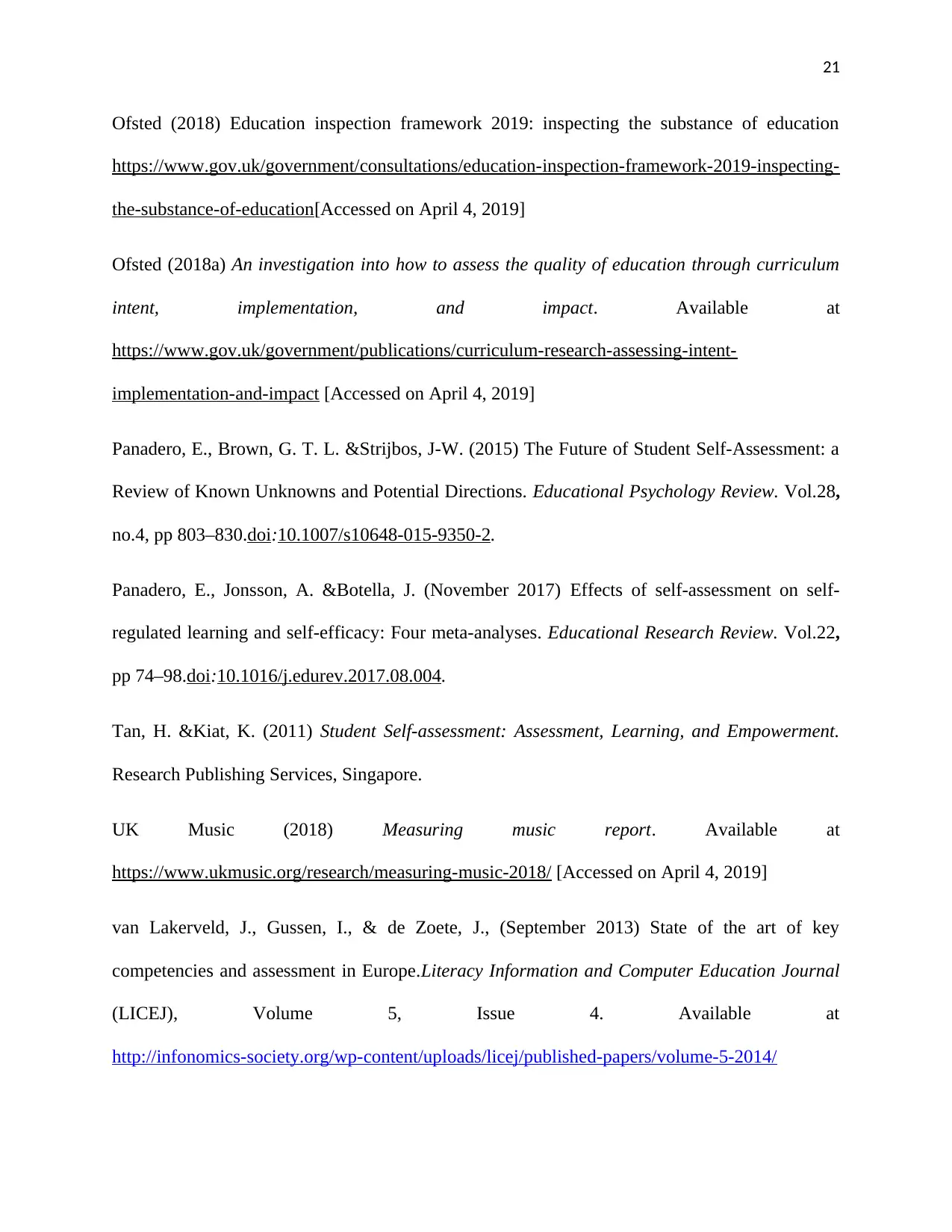
21
Ofsted (2018) Education inspection framework 2019: inspecting the substance of education
https://www.gov.uk/government/consultations/education-inspection-framework-2019-inspecting-
the-substance-of-education[Accessed on April 4, 2019]
Ofsted (2018a) An investigation into how to assess the quality of education through curriculum
intent, implementation, and impact. Available at
https://www.gov.uk/government/publications/curriculum-research-assessing-intent-
implementation-and-impact [Accessed on April 4, 2019]
Panadero, E., Brown, G. T. L. &Strijbos, J-W. (2015) The Future of Student Self-Assessment: a
Review of Known Unknowns and Potential Directions. Educational Psychology Review. Vol.28,
no.4, pp 803–830.doi:10.1007/s10648-015-9350-2.
Panadero, E., Jonsson, A. &Botella, J. (November 2017) Effects of self-assessment on self-
regulated learning and self-efficacy: Four meta-analyses. Educational Research Review. Vol.22,
pp 74–98.doi:10.1016/j.edurev.2017.08.004.
Tan, H. &Kiat, K. (2011) Student Self-assessment: Assessment, Learning, and Empowerment.
Research Publishing Services, Singapore.
UK Music (2018) Measuring music report. Available at
https://www.ukmusic.org/research/measuring-music-2018/ [Accessed on April 4, 2019]
van Lakerveld, J., Gussen, I., & de Zoete, J., (September 2013) State of the art of key
competencies and assessment in Europe.Literacy Information and Computer Education Journal
(LICEJ), Volume 5, Issue 4. Available at
http://infonomics-society.org/wp-content/uploads/licej/published-papers/volume-5-2014/
Ofsted (2018) Education inspection framework 2019: inspecting the substance of education
https://www.gov.uk/government/consultations/education-inspection-framework-2019-inspecting-
the-substance-of-education[Accessed on April 4, 2019]
Ofsted (2018a) An investigation into how to assess the quality of education through curriculum
intent, implementation, and impact. Available at
https://www.gov.uk/government/publications/curriculum-research-assessing-intent-
implementation-and-impact [Accessed on April 4, 2019]
Panadero, E., Brown, G. T. L. &Strijbos, J-W. (2015) The Future of Student Self-Assessment: a
Review of Known Unknowns and Potential Directions. Educational Psychology Review. Vol.28,
no.4, pp 803–830.doi:10.1007/s10648-015-9350-2.
Panadero, E., Jonsson, A. &Botella, J. (November 2017) Effects of self-assessment on self-
regulated learning and self-efficacy: Four meta-analyses. Educational Research Review. Vol.22,
pp 74–98.doi:10.1016/j.edurev.2017.08.004.
Tan, H. &Kiat, K. (2011) Student Self-assessment: Assessment, Learning, and Empowerment.
Research Publishing Services, Singapore.
UK Music (2018) Measuring music report. Available at
https://www.ukmusic.org/research/measuring-music-2018/ [Accessed on April 4, 2019]
van Lakerveld, J., Gussen, I., & de Zoete, J., (September 2013) State of the art of key
competencies and assessment in Europe.Literacy Information and Computer Education Journal
(LICEJ), Volume 5, Issue 4. Available at
http://infonomics-society.org/wp-content/uploads/licej/published-papers/volume-5-2014/
Secure Best Marks with AI Grader
Need help grading? Try our AI Grader for instant feedback on your assignments.
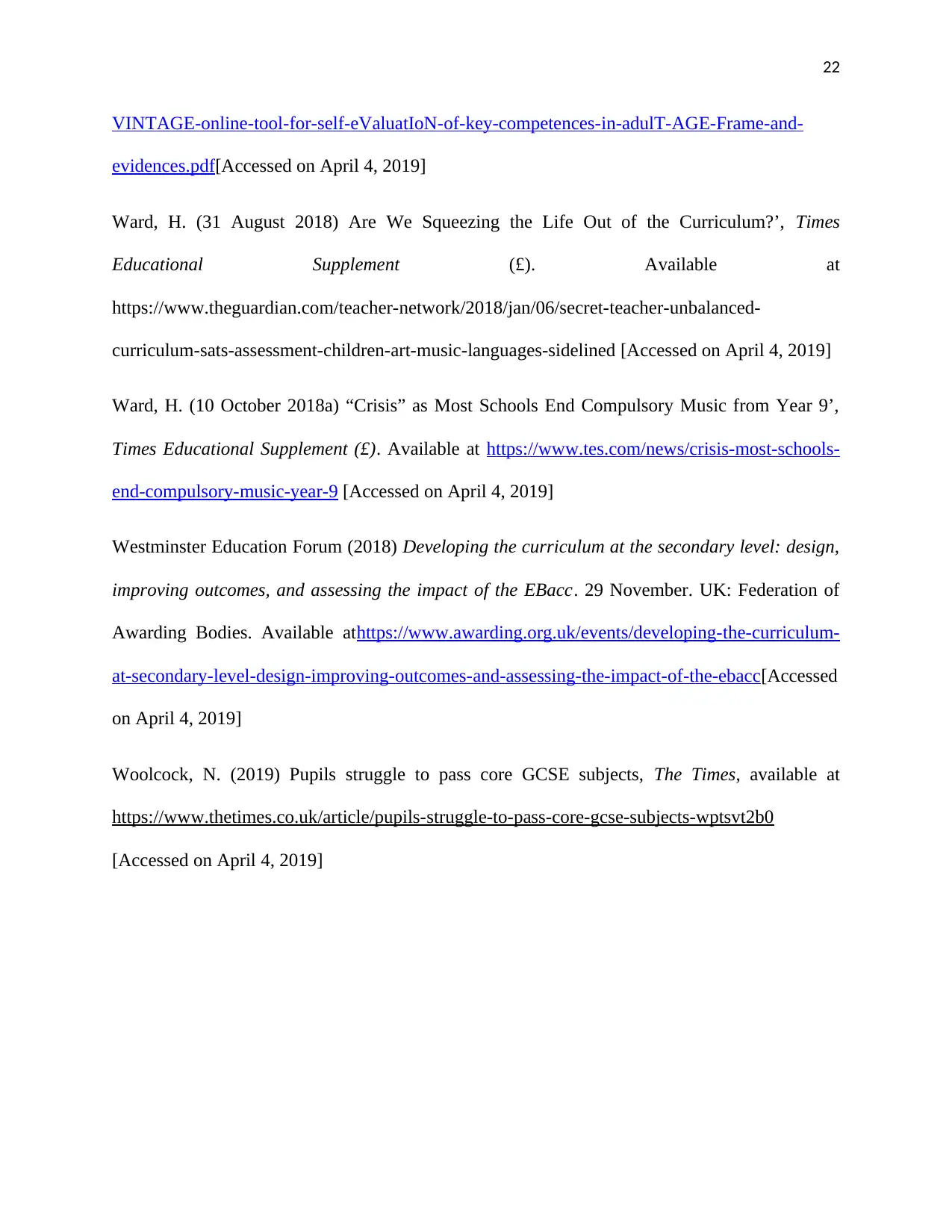
22
VINTAGE-online-tool-for-self-eValuatIoN-of-key-competences-in-adulT-AGE-Frame-and-
evidences.pdf[Accessed on April 4, 2019]
Ward, H. (31 August 2018) Are We Squeezing the Life Out of the Curriculum?’, Times
Educational Supplement (£). Available at
https://www.theguardian.com/teacher-network/2018/jan/06/secret-teacher-unbalanced-
curriculum-sats-assessment-children-art-music-languages-sidelined [Accessed on April 4, 2019]
Ward, H. (10 October 2018a) “Crisis” as Most Schools End Compulsory Music from Year 9’,
Times Educational Supplement (£). Available at https://www.tes.com/news/crisis-most-schools-
end-compulsory-music-year-9 [Accessed on April 4, 2019]
Westminster Education Forum (2018) Developing the curriculum at the secondary level: design,
improving outcomes, and assessing the impact of the EBacc. 29 November. UK: Federation of
Awarding Bodies. Available athttps://www.awarding.org.uk/events/developing-the-curriculum-
at-secondary-level-design-improving-outcomes-and-assessing-the-impact-of-the-ebacc[Accessed
on April 4, 2019]
Woolcock, N. (2019) Pupils struggle to pass core GCSE subjects, The Times, available at
https://www.thetimes.co.uk/article/pupils-struggle-to-pass-core-gcse-subjects-wptsvt2b0
[Accessed on April 4, 2019]
VINTAGE-online-tool-for-self-eValuatIoN-of-key-competences-in-adulT-AGE-Frame-and-
evidences.pdf[Accessed on April 4, 2019]
Ward, H. (31 August 2018) Are We Squeezing the Life Out of the Curriculum?’, Times
Educational Supplement (£). Available at
https://www.theguardian.com/teacher-network/2018/jan/06/secret-teacher-unbalanced-
curriculum-sats-assessment-children-art-music-languages-sidelined [Accessed on April 4, 2019]
Ward, H. (10 October 2018a) “Crisis” as Most Schools End Compulsory Music from Year 9’,
Times Educational Supplement (£). Available at https://www.tes.com/news/crisis-most-schools-
end-compulsory-music-year-9 [Accessed on April 4, 2019]
Westminster Education Forum (2018) Developing the curriculum at the secondary level: design,
improving outcomes, and assessing the impact of the EBacc. 29 November. UK: Federation of
Awarding Bodies. Available athttps://www.awarding.org.uk/events/developing-the-curriculum-
at-secondary-level-design-improving-outcomes-and-assessing-the-impact-of-the-ebacc[Accessed
on April 4, 2019]
Woolcock, N. (2019) Pupils struggle to pass core GCSE subjects, The Times, available at
https://www.thetimes.co.uk/article/pupils-struggle-to-pass-core-gcse-subjects-wptsvt2b0
[Accessed on April 4, 2019]
1 out of 23
Related Documents
Your All-in-One AI-Powered Toolkit for Academic Success.
+13062052269
info@desklib.com
Available 24*7 on WhatsApp / Email
![[object Object]](/_next/static/media/star-bottom.7253800d.svg)
Unlock your academic potential
© 2024 | Zucol Services PVT LTD | All rights reserved.





